#plans on world domination because he believes people can only achieve peace if they all worship him
Text
Fucked Up Sleeping Habits
Roll a d100 every time you take a long rest. Under normal conditions, rolling a 20 or below will result in such a vivid nightmare you take an exhaustion point. If you are particularly hurt, particularly calm, or there are any other factors influencing your sleep, raise or lower the DC as you see fit. This counts as a general ability check and is rolled flat. Under unnatural conditions for sleep such as sleeping spells or being knocked out, the DC is automatically passed.
Death from Fucked Up Sleeping Habits exhaustion is not instant. After receiving the 6th point you become fevered, and if you are stabilised or healed within three hours, you regain 1 hit point and are unconscious until 24 hours pass. In this time, you can’t have nightmares, and will wake up with only 2 exhaustion points. Healing spells cast in a 3rd level spell slot or higher can revive you before 24 hours pass, but you will wake up with 4 exhaustion points.
#dnd#homebrew#dnd homebrew#dnd 5e#homebrew mechanic#i should not be trusted to make characters. i sat down with a word doc and vague vibe of ‘charismatic asshole’#then blacked out and woke up with 5k words of backstory on this fucker who believes in his own superiority (as a person and an aasimar)#tried to commit a gen0c!de on his own people after one (1) person openly disliked him#murdered his wife and father figure out of love for them#plans on world domination because he believes people can only achieve peace if they all worship him#and is a wARLOCK FOR THE BB FUCKING G#he also hasn’t slept a full nights sleep for thirty years due to mechanics.#so i made this for him and my dm laughed at me#use if you would like to put yourself through unreasonable bullshit! :D
5 notes
·
View notes
Note
Umm, do you write fluff alphabet? could you do it for Sebastian Michaelis from black butler?
It's alright if you don't, sorry for the trouble.
🤍 Sebastian Michaelis Fluff Alphabet 🤍
Activities - What do they like to do with their s/o? How do they spend their free time with them?
Sebastian would love to spend time with some of his feline friends with your company, the two of his most favourite creatures on Earth. Sebastian also enjoys taking long strolls along with you, engaging in some deep and meaningful conversation.
He enjoys teaching, and so he'll always be up to teach his s/o something new that they've been wanting to learn or something he feels they should learn. He'll probably end up showing off his skills though.
Beauty - What do they admire about their s/o? What do they think is beautiful about them?
Sebastian is beyond petty concepts such as physical attractiveness, if his s/o's personality has managed to intrigue and interest him, he will greatly admire that. He'll admire how your personality stands out compared to the other human beings, your unique traits and interests, the way you view the world, and above all, your ability to love a monster like him.
Comfort - How would they help their s/o when they feel down?
Sebastian will give you your space to figure out things on your own, but if you require his comfort and support he will immediately rush to your side, providing you with any and every thing you need. He will listen to all your feelings if you're willing to pour them out, he's more than willing to provide you with a shoulder to cry on.
Even though he doesn't understand the complexity of human emotions, he's learned comfort mechanisms over the years.
Dreams - How do they picture their future with their s/o?
Given the current situation, he does not see his relationship with you evolving at all. However, if a miracle happens and the contract does reach an end, he might drag you to hell with him.
Equal - Are they the dominant one in the relationship, or rather passive?
No, Sebastian will not see you as his equal or as superior to him. Humans are lowly creatures, and to be honest, you're no exception. He's definitely the dominant one, but he is also very respective of you.
Fight - Would they be easy to forgive their s/o? How are they fighting?
Sebastian has a good amount of control over his wrath, he won't speak anything till he feels it's absolutely necessary. He'll be fine if you aplogise to him, but it's never the other way around. You'll never get an apology from him, he's too proud to say sorry.
Gratitude - How grateful are they in general? Are they aware of what their s/o is doing for them?
He is always aware of the littlest of things you do for him, and he will even try to return your gestures. The return of gestures is mostly done in physical forms, such as hand holding, kisses, cuddles, and sometimes when you're lucky he'll even bake you a few sweets and make you some tea. None of your affections go unnoticed.
Honesty - Do they have secrets they hide from their s/o? Or do they share everything?
Oh dear, he has millions of secrets that he keeps hidden from you. Mostly because they're horrifying and could give you nightmares for days, they're secrets your frail human mind might not be able to handle.
Inspiration - Did their s/o change them somehow, or the other way around? Like trying out new things or helped them overcome personal problems?
Not really, the only change that came in him after he met you was that he felt a slight amount of love in his cold, ruthless heart, and he was willing to protect someone outside of a contract.
Sebastian usually has no personal problems, even if he did he's perfectly capable of finding the solutions on his own. He'll not want to burden you with his problems.
Jealousy - Do they get jealous easily? How do they deal with it?
This demon is possessive of what belongs to him, and so he absolutely won't stand it if someone's trying to steal you from him, they will be annihilated.
Kiss - Are they a good kisser? What was the first kiss like?
There's no questioning Sebas-chan's kissing skills, he's excellent. He'll always leave you craving for more. His kisses are the most passionate, rough and yet gentle.
The first kiss was probably planned out by him, even though you were oblivious to it. He took you out for a peaceful evening walk in the gardens, and it naturally happened in the flow of the moment. The two of you leaned in till your lips met, and he pulled you closer to him deepening it.
Love Confession - How would they confess to their s/o?
After the very first kiss that the two of you shared, Sebastian would tell you that he holds some amount admiration for you and that does not consider you as just another pest human. That's it, that was his confession.
Marriage - Do they want to get married? How do they propose? What would the marriage be like?
Sebastian doesn't think that marriage is necessary for you two to become closer, but if you want be wedded to him, he will gladly do it. The function won't be a grand or an official one, just the two of you simply declaring your vows to each other.
He'll only marry you after his current contract is over, though.
Nicknames - What do they call their s/o?
You'll be called regular nicknames such as 'darling' or 'my love', but his favourite is surely 'kitten'.
On Cloud Nine - What are they like when they are in love? Is it obvious for others? How do they express their feelings?
This butler is a master of masking his emotions, nobody will get even the slightest of hint that he's in love with somebody. Though when he's alone with you, he'll allow himself to be vulnerable and show how much he loves you quite freely.
PDA - Are they upfront about their relationship? Do they brag with their s/o in front of others? Or are they rather shy to kiss etc. when others are watching?
Sebastian won't be very affectionate in public, and will prefer to keep his relationship a secret to maintain his 'perfect butler' image in front of people.
He's won't mind occasional hand holding and kisses when nobody is looking though.
Quirk - Some random ability they have that’s beneficial in a relationship.
He's simply one hell of a butler, but I'm pretty sure he can give you a glimpse of heaven, if you know what I mean ;)
Romance - How romantic are they? What would they do to make their s/o happy?
Quite romantic. He'll romance you all he can in his free time. He's an affectionate demon, in his alone time he's always in physical contact with you in one way or the other.
He'll study through human romantic gestures for you, even though he finds them silly. But as long as you're happy, he'll do anything.
Support - Are they helping their s/o achieve their goals? Do they believe in them?
Yes, he will support you unconditionally. And trust me, if he believes in you and says you can do it, you can. He won't give you false hopes and motivate you to do things that are beyond your capabilities.
He's willing too help you if you ever need it. It's a pleasure to him when he's the reason behind your success.
Thrill - Do they need to try out new things to spice out your relationship? Or do they prefer a certain routine?
Sebastian will leave that up to you. If you like routine, he'll stick to it. However, if you believe that you need to try out new things to spice up your relationship, he'll do that as well.
You'll have to specify what exactly you want to do to spice it up though, ask and he will bring it to you.
Understanding - How good do they know their partner? Are they empathetic?
He can read human emotions to some extent, but he won't be able to figure out what exactly is bothering you. If you're vocal about it, he will absolutely help you put. He's always putting in effort to understand you better.
He's a demon, empathy is something he absolutely will not feel. A tiny bit of sympathy might arise, but don't expect him to be empathetic.
Value - How important is the relationship to them? What is it’s worth in comparison to other things in their life?
After his young master, you are his second priority. You hold an important position in his life, but he will never put you before his young master. He's bound by contract to him, after all.
You are the only one who can make him feel the slightest bit of emotion, filling his heart with a strange warmth he has never experienced. Being a demon he must consume souls as food, and other than that, you're the other thing important in his life.
Wild Card - A random Fluff Headcanon.
Being a demon, he doesn't require sleep, but he does love to lie down and watch you beside you as you sleep. The sight of your chest falling and rising rhythmically and your peaceful face fills him with a peaceful feeling. He only wonders what sleep feels like to humans.
And he loves to coddle you while you're fast asleep. He finds the sight rather cute.
XOXO - Are they very affectionate? Do they love to kiss and cuddle?
Sebastian is fond of expressing himself through physical touch, so a certain amount cuddles and kissing is involved. He won't admit it but he misses your touch when you're not around.
Kissing you is one of his favourite things to do. The sight of your flushed face and heavy breathing after he's done with ravaging your lips fills him with pride.
Yearning - How will they cope when they’re missing their partner?
He'll try to lose himself in his work, and even seek the company of his beloved cats. He actually won't miss you unless you're going away for too long, and in that case, secret visits are guaranteed.
Zeal - Are they willing to go to great lenghts for the relationship? If so, what kind of?
Yes, you hold an important place in his cold heart, and he's grown rather fond of you. He'll go any lengths to keep you with him and protect you, because you're the only one who he's willing to make himself vulnerable to.
#sebastian michaelis x reader#sebastian x you#sebastian x reader#sebastian x y/n#black butler x reader#fluff alphabet
236 notes
·
View notes
Text
SNK 139.5: Towards the Final Pages with no Final Answers
The final pages of the updated ending are bold, but I think ultimately more evocative than the original preliminary ending.
Even after the intensely polarized reader reception that took issue with the lack of storytelling precision and clarity when it was most needed, SNK chose to end with a decisively ambiguous symbol. In literature, a symbol is something that clearly means something -- but with the most "literary" symbols, their meaning cannot be absolutely defined; any attempted answer as to what a symbol represents has no finality or certainty, and interpretation will remain ever open to debate. A symbol both invites and resists interpretation.
Naturally, the immediate response to the symbolic tree on the final page is to try answering the invitation to the question, "What does it mean?"
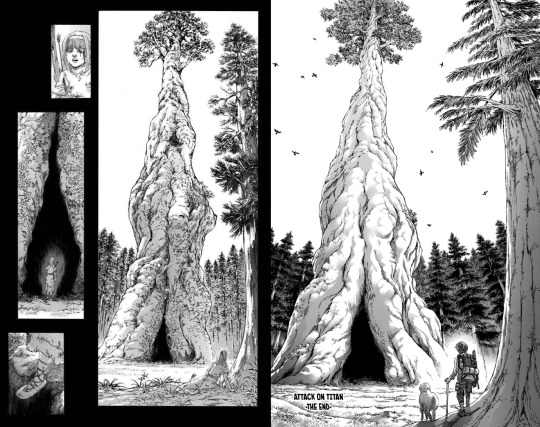
One prominent answer I've seen is that it symbolizes the continuation of the cycle of war and violence either because a) of the symbolic parallel to Ymir or b) on a more literal level, that it implies the actual potential revival of new era of Titans. A reasonable interpretation either way, but also, I think, an incomplete one.
The first reason for this is that "the endless cycle of war" was already clearly and powerful represented in the preceding panels:
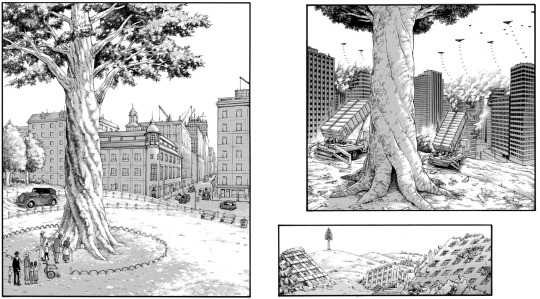
The cycle of war was already continuing in the decades or centuries before the child arrived at the tree. A culminating image symbolizing the persistence or resurgence of an era of war as the final panel would thus arguably be redundant and unnecessary.
Furthermore, the chapter is entitled "Toward the Tree on That Hill." If the tree were simply a symbol of war, by implication the chapter could equally be called 'toward the endless cycle of war'. But such a relentlessly bleak and tonally flat ending sentiment would be firmly incongruous with the story's recurrent conviction in the equal cruelty and beauty of the world -- a conviction that I believe it has been faithful to all the way to its end.
The Long Defeat
But while on this topic of war, let's linger a moment on the "cruelty" side and the consequence of this wordless construction and subsequent destruction of a city -- the most bold and possibly controversial additional panels that are also my personal favourite additions.
One objection that has emerged against this brief sequence of Paradis' apparent destruction is that it renders the entire story to be "pointless". Eren's 80% Rumbling, Armin's diplomatic peace talks between the remnants of the Allied Nations and Paradis, and before that, the proposal of the 50-year plan and Zeke's euthanasia plan... everything, to the very beginning to the Survey Corps' dreams of some kind of freedom; was it all for nothing? All that striving, that hope, that final promise bestowed upon Armin: was it all a pointless story? Even more radically, is the story suggesting that Eren might as well have continued the Rumbling to 100% of the earth? Was Zeke's euthanasia plan the cruel but correct choice all along? What was the point of rejecting the 50-year plan if that had a greater chance of success at preventing this outcome?

I think Isayama suddenly pulling back to such a long-term view of history to the scale of decades or even centuries into the future calls for a reorientation in attitude towards exactly what kind of story we have been reading. Yes, if the metric is Paradis' survival, maybe it was indeed all "pointless". But that's also to say that, on the broadest scale, SNK is a story about futility, that it is a deliberate representation of the struggle to make one's actions historically meaningful.
In the long view of history, all the events, from Grisha running beyond the wall to see the airships and the first breaking of Wall Maria to Erwin's sacrifices, Paradis' discovery of the outside world, and finally to the Battle of Heaven and Earth, it would all merely be a handful of chapters in the history textbooks of the future. A future in which war and geopolitical conflict will continue even without Titans. That does not mean that all paths to the future are equal -- the 50-year plan would not have put an end to Titans, and Zeke's euthanasia plan distorts utilitarian ethics into just another form of oppression; there are better and worse decisions that lead to more and less degrees of suffering, but no decision can ever be the final one.
The additional panels remind us that in history, there never exists a singular "Final Solution". The reason there are readers who vehemently support Eren to have flattened 100% of the world, and the reason the Paradisians supported the oppressive, authoritarian, proto-fascist Jaegar Faction under Floch and even after the Rumbling, is that because they want to believe that a Final Solution to end conflict exists and will work. They resist the fundamental uncertainty and complexity of the situation, instead preferring a singular, unified, and coherent Answer to Paradis' struggle to survive. I'm reminded of the scholar Erich Auerbach's theorization of why fascism appealed to many people during periods of political and social crisis, change, and uncertainty. Writing in exile after fleeing Nazi Germany, he observed that:
"The temptation to entrust oneself to a sect which solved all problems with a single formula, whose power of suggestion imposed solidarity, and which ostracized everything which would not fit in and submit - this temptation was so great that, with many people, fascism hardly had to employ force when the time came for it to spread through the countries of old European culture." (from Mimesis p. 550)
This acutely describes the Jaegar Faction's rise to power and continued dominance in Paradis. But their promise of unity, of a single formula to wipe out the rest of the world either literally through the Rumbling, or to dominate them with military force, is a false one. Even if Eren had Rumbled 100% of the world instead of 80%, history would still go on. The external threat of the world may have been eliminated, but internal conflict and violence would still continue onward throughout the generations born on top of the blood of the rest of the world. Needless to say, out of all the options, Eren's 80% Rumbling is the very epitome of perpetuating the cycle of violence as it creates tens of thousands of war orphans like Eren once was, and it would justify employing violence for one's own self-interest to an extreme degree. For the generations to come that would valourize Eren as a hero, it would set a dangerous precedent for what degree of destruction is acceptable for self-defence -- nothing short of the attempt to flatten the entire world. It is no surprise that Paradis would meet a violent end when its founding one-party rule of the Jaegar Faction has their roots in such unapologetically bloody foundations.
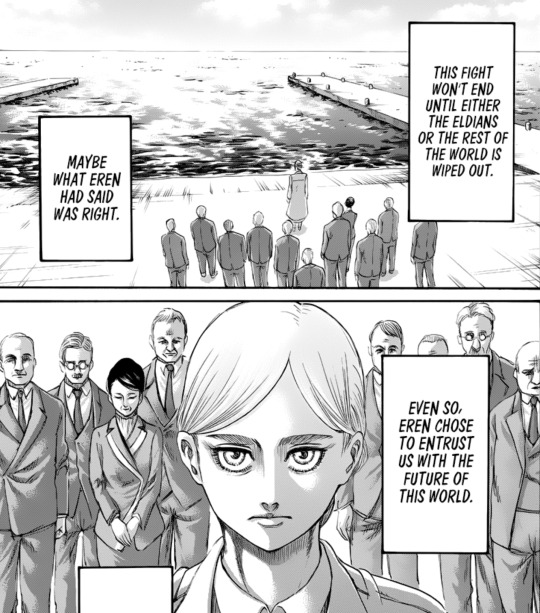
Neither the 80% Rumbling nor the militaristic, ultra-nationalistic Jaegar faction that come to govern Paradis are glamourized as the "correct" solution to ensuring Paradis' future. (This can also put to rest any accusations of SNK's ending as "fascist" or "imperialist" propaganda, since the island's modern nation that they founded ends in war. All nations must fall eventually, but not all do in such blatant destruction). Importantly, neither is Armin's diplomatic mission naively idealized as that which permanently achieves world peace. No singular or unifying formula can work because reality is complicated. Entrusting oneself to seemingly simple Answers is simply insufficient, even if they are ideals of peaceful negotiation; that method may work given the right conditions, but the world will always eventually complicate its feasibility.
After all in the real world, there's the absurd irony that some in the West had called the First World War "The War to End all Wars". These days, WWI is merely one long chapter in our textbooks just a few pages away from the even longer chapter of the Second World War that is followed by all the rest of the conflicts that have followed since then even with the establishment of diplomatic organizations like the United Nations. In this sense, showing Paradis' eventual downfall is perhaps the only way to end such a series that is so concerned with history, from King Fritz's tribal expansion into empire, the rise and fall of Marleyan ascendency, and finally of the survival and apparent shattering of Paradis.
From its beginning to its end, SNK has poignantly evoked J.R.R. Tolkien's conception of history as The Long Defeat. In one character's words, "together through ages of the world we have fought the long defeat". That is to say, "no victory is complete, that evil rises again, and that even victory brings loss".
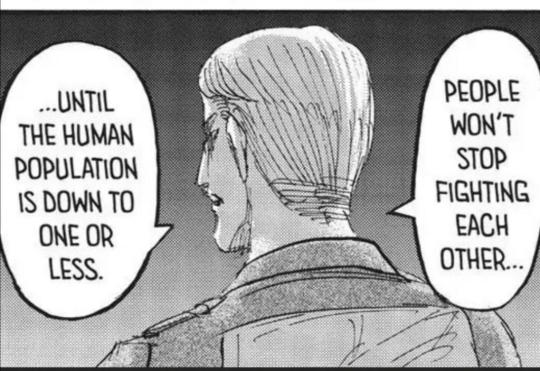
No heroes, only humans
Eren's desperate, fatalistic resignation to committing the Rumbling, along with the characters' rejection of all the rest of the earlier plans to ensure Paradis a future, are merely the actions of human beings to that began with the need to find not even necessarily a Final Answer, but at least an acceptable and feasible one for the time being. But the characterization of Eren's confusion, childishness, and regret in the final chapter is startlingly real in how it demonstrates how, all along, we have been dealing not with grand heroes, but simply people who have no answers at all. SNK has always been about failures - and often ironic failures; it has always been a story about painful and frequently futile struggle.
People make mistakes, they can be short-sighted, selfish, biased, immature, petty, and irrational, and I think the ending follows through with depicting the consequences of that.

Erwin's self-sacrifice before being able to reach the basement (and his regression to a childhood state in the moments before his death), Kenny's futile chasing after that universal compassion he had seen in Uri, Shadis never being acknowledged by history despite his final heroic action, and so on -- these stories of ironic, futile failures are still meaningful in their mere striving. Eren's ending and Paradis' demise despite Armin's endeavour to ensure them a peaceful future are entirely consistent with this.
SNK certainly follows the shounen trope in which young individuals are bestowed great power and correspondingly great responsibility, and must then reconcile the burden of possessing that greatness on which the fate of the world depends. Yet it is equally defined by its representation of the state that us normal human beings confront everyday: the struggle against the apparent powerlessness to enact any meaningful or lasting change at all. Simultaneously, this helpless state does not exempt us from the responsibility to act in whatever small capacity we are able to resist oppression, ideological extremism, and the perpetuation of violence.
Towards That Symbol
That was a rather long but vital digression about the additional "construction and destruction" pages. To return to the issue of the symbolism in the final panel, here I will turn from seemingly affirming the tree as symbolizing the cycle of violence, towards what I think is the greater complexity of what the tree might "actually" symbolize.
As I've said above, I don't believe that the final chapter title is synonymous with 'toward the endless cycle of war'. In tone, theme, and characterization, SNK has always been defined by the tension between cruelty and beauty, the will to violence and the underlying desire for peace, and the rest of the contradictory impulses that all simultaneously coexist. The end of SNK as a whole commits to a similar lack of closure, ambiguity, and interpretive openness.
So far I have rambled on about only a view of the perpetual "cruelty" of history. Where, then, is the "beauty"?
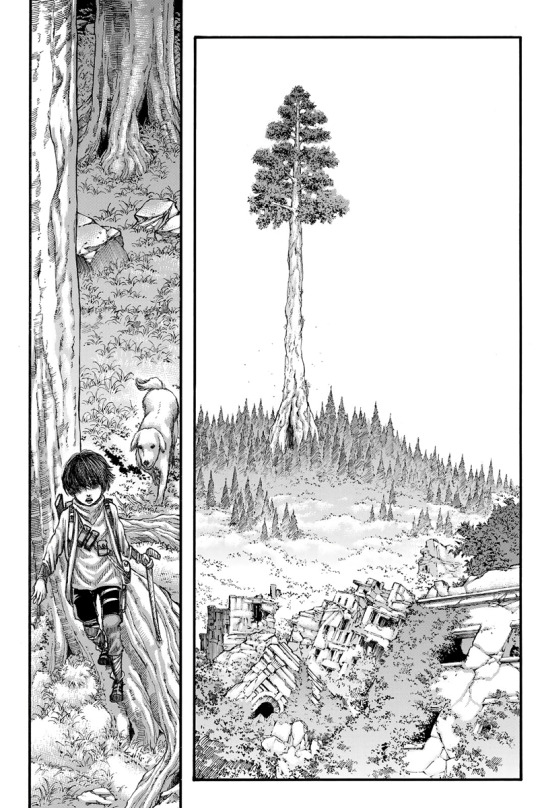
In short, the "tree = cycle of violence" interpretation is obviously based on how that this tree recalls the original tree in which the spine creature, as the source of the power of the Titans, resided. But it's worth first considering, what exactly is this creature? We seem to get our answer in the chapter that most precisely crystallizes the dual "cruelty and beauty" of the world:
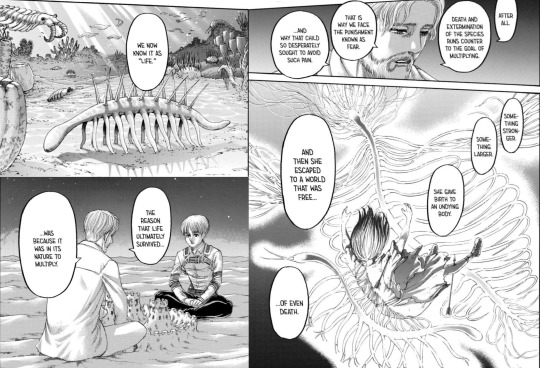
The spine creature might be said to be life itself. Or more specifically, the will of life to perpetuate itself, for no reason at all but for the fleeting moments in which we feel distinctly glad to have existed in the world.
The creature at the source of the Titans, and in extension the Titans themselves, is neither inherently a positive or negative, "good" or "evil", creative or destructive force. It's both and all of those at once. As with any power, the Titans were merely a tool that was put to use to oppressive ends.
So as I now suggest that the tree at the end is symbolically a "Tree of Life", I don't at all mean "life" in the typically celebratory or optimistic sense: rather, I mean it in the ambiguous, ambivalent, uncertain, and complex sense that has been evoked throughout the above discussion of the inevitable continuation of war.
The title "Toward The Tree on That Hill" is derived from its associations with Eren and Mikasa, but more specifically of course, from Armin's affirmation of existence. However, the tree as a symbol of existential affirmation is undercut with the revelation that, despite Armin's diplomatic mediation between the Allied Nations and Paradis, the island nation never escapes war just as no nation in the history of the earth has ever fully escaped war.

The image of Armin running toward that life-affirming tree by the end becomes twisted and complicated, as the image of the anonymous child approaching the Tree of Life evokes both awe at its beauty and grandeur, and a deep dread at the foreboding of its cyclical return to Ymir's tree that signalled the beginning of a bloody era.
And I think that is precisely it: Life is not some idealized, beautiful vision that we always want to run toward; it is also ironic, complicated, and dreadful. It is ambivalent. Like a literary symbol, the meaning of life cannot be pinned down absolutely. The tree therefore becomes itself a symbol of uncertainty, of an open future that is cyclical both in its beauty and war.
As a final observation, it is surely no coincidence that, the small, black, birdlike silhouettes of the war planes destroying the city from the sky is replaced by the similarly small black silhouettes of birds in the final panel.
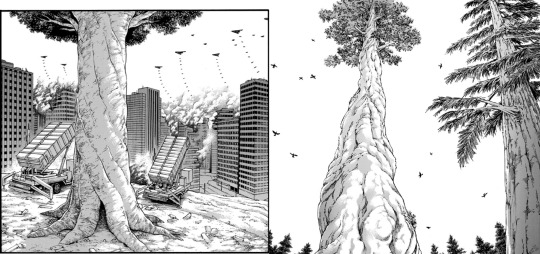
If the birds represent freedom from war, the irony is that the immediately surrounding land appears to be one completely empty of people save for the exploring child; it is a freedom attained only without people's presence. Yet at the same time, a child from some existing civilization has reached it; perhaps it is freedom that they have reached, perhaps it is something else that they see in the tree. What is it that they were looking for? What does the tree and its history represent for the child, and what does it mean for their future? Alternatively, does the child-in-the-forest imagery negatively recall the warning that the world is one huge forest of predator and prey that we need to protect children from entering?
Rather than providing answers, this tree embodies all of the potential questions, and all of the potential answers. These possibilities will unfold themselves into an uncertain future beyond the chapters of history that Eren, Armin, Mikasa, Zeke, Erwin, and all the rest of the characters were part of and left their mark on; and whatever future this child will witness or create, it will similarly be one of the struggle against futility, as the journey begins anew with each generation in every new era. Neither - or both - hopeful or despairing, the final image of this tree, just like life itself, contains those innumerable irresolvable tensions as it gestures towards all possibilities, both oppressive and free.
#snk 139#snk ending#snk extra pages#snk meta#snk#snk spoilers#brain dump#this is a pretty personal interpretation so if there are any logical inconsistencies i don't know what to do with them#yes the execution of the final arc/chapter is flawed but it's still very conceptually interesting#i still have my disappointments but overall i've made my peace with it#translating my tangled thoughts into words however imperfectly: i think that's what freedom is all about#snk manga#aot#aot 139#aot ending
232 notes
·
View notes
Note
fluffy alphabet for Bertholdt 💳💥💥💥💳💥💥💥💳 (if you want too ofc 💕💕)
Of courseee :)
I’m generally very unsure about the way I characterize Bertholdt, so if this is really crappy I apologize <3
As always, I'm using the prompt by @snk-warriors
Fluff Alphabet: Bertholdt
A ctivities - What do they like to do with their s/o? How do they spend their free time with them?
He definitely likes more private activities, like maybe a picnic, for special occasions or date nights. In general, though, he just likes spending time with his SO. On an ordinary day, he’s happy just sitting with them while they both do some work or just watch TV. He’s more enjoying being in their presence than whatever activity they’re working on.
B eauty - What do they admire about their s/o? What do they think is beautiful about them?
This poor baby thinks absolutely everything about their SO is stunning. Like every time they walk into the room, he’s taken aback by how amazing they are. But really he does admire their personality more than anything, and it’s what he fell in love with.
C omfort - How would they help their s/o when they feel down/have a panic attack etc.?
I think he’s pretty uncomfortable at first just because he hates seeing his SO unhappy, and he really doesn’t know what to do. His instinct is to just sit down with them quietly and offer a shoulder to cry on. Unless they specifically ask that he do something else when this happens, he’ll probably continue to do it.
D reams - How do they picture their future with their s/o?
He honestly doesn’t think about the future much. He absolutely has a lot of inner conflict around his identity, and his future has never really been guaranteed. As long as his SO is with him, he’d be happy.
E qual - Are they the dominant one in the relationship, or rather passive?
It’s pretty equal, but I think he leads more towards a passive role just because of his personality. He’s a bit shy by nature, and arguably more of a follower than a leader, so I think he’d like to be the one that’s being protected in the relationship. At the same time, he’d definitely want to be the one protecting his SO, so it varies.
F ight - Would they be easy to forgive their s/o? How are they fighting?
He doesn’t really instigate fights, and he’s not great with conflict. It makes him sort of retreat into himself, but because of how unhappy fighting makes him, he’s always open to talk and make up. He’s definitely rational in these situations, and he really wants to come to an agreement.
G ratitude - How grateful are they in general? Are they aware of what their s/o is doing for them?
He is BEYOND grateful. In his eyes, his SO is absolutely perfect, and he doesn’t even really feel like he’s deserving of their love and attention. He thanks them constantly, and he truly and deeply appreciates everything they do.
H onesty - Do they have secrets they hide from their s/o? Or do they share everything?
In general, he’s very open and honest with his SO, especially with things that are serious or important. But, he also cares about them and doesn’t want to see them get hurt, so if he finds something out that could make them upset, he may decide not to tell them. He doesn’t love it, but it’s his way of subtly protecting them.
I nspiration - Did their s/o change them somehow, or the other way around? Like trying out new things or helped them overcome personal problems?
His SO is probably a huge inspiration to him. Again, he thinks they are so amazing, and the idea that they would want to be with him gives him the slightest boost in confidence. I think they also help and encourage him to branch out and try new things, so they’re helping him get comfortable with lettin loose a bit.
J ealousy - Do they get jealous easily? How do they deal with it?
He honestly does get jealous sometimes. It’s not that he doesn’t trust his SO completely, because he does, it’s just that he begins to question whether they would be better off with someone else. He may start to pull away a bit when he’s jealous, which is pretty easy to spot. And he can be pretty easily reminded that he doesn’t need to be jealous, with just some hugs and positive words.
K iss - Are they a good kisser? What was the first kiss like?
Their first kiss was VERY awkward. He planned it for a while so the general pacing fit the relationship, but he probably messed up the timing in the moment, and it was really unexpected for his SO. It wasn’t bad necessarily, he just way overthought it, and he apologized about a thousand times afterwards. A bit later into the relationship, once he’s let himself relax a bit, it’s probably much easier for him, and he’s actually a pretty good kisser.
L ove Confession - How would they confess to their s/o?
He spent a lot of time planning, again, but this time, I think he chose the perfect moment. They were probably just out for a late night walk when he looked over to see how beautifully the stars were lighting up their face, and he told them he loved them. It was really sweet, and he makes an effort to say it as much as he can from then on.
M arriage - Do they want to get married? How do they propose? What would the marriage be like?
I don’t think he’s really though about marriage the same way that he hasn’t thought about his future. Legally combining another persons life with his when his own life isn’t even guaranteed is pretty frightening for him. But, if it’s something his SO wanted, he wouldn’t be opposed to it. He probably wouldn’t be the one to propose, but he’d be more than willing to help with the planning for the wedding (and he’s surprisingly good at it)
N icknames - What do they call their s/o?
Definitely something just a bit cheesy, like honey or darling. He also just loves to call you by your name, though, because he thinks it’s a beautiful name.
O n Cloud Nine - What are they like when they are in love? Is it obvious for others? How do they express their feelings?
There’s such a noticeable change when he first falls in love. He has an obvious air of confidence in his daily interactions, and he’s much less nervous in general. He also probably talks about his SO a lot more in conversation with other people, which is uncommon. He works hard to express it clearly for his SO, so he showers them with little praises and tiny acts of service.
P DA - Are they upfront about their relationship? Do they brag with their s/o in front of others? Or are they rather shy to kiss etc. when others are watching?
He’s definitely a private person, especially with his relationship. His friends and family would be generally aware of it, and his SO is welcome to tell the people in their life as well. But he’s strongly anti-PDA; at most, he might hold their hand in a public setting or let them rest his head on their shoulders. He gets uncomfortable showing off something that’s meant for just the two of them.
Q uirk - Some random ability they have that's beneficial in a relationship.
He’s incredibly empathetic to the point that he looks telepathic. He can almost always figure out what’s going through his SO’s mind at any given point and can predict how they will react to a situation. It also helps him be able to comfort them, and understand them more.
R omance - How romantic are they? What would they do to make their s/o happy? Cliché or rather creative?
Probably a nice mix of both creative and cliche. He’s never gotten that cliche romantic relationship with teddy bears and dinner dates, so I think he’d indulge in that once in a while just to make his inner lonely teenager happy. But for the most part, he’s very creative, and they definitely don’t follow the confusing societal norms for relationships. He really is very romantic, though, even if it makes him a bit embarrassed.
S upport - Are they helping their s/o achieve their goals? Do they believe in them?
He absolutely believes in and supports his SO more than anything! They are so terrific, and he knows they can do whatever they put their mind to. He’s only an optimist when it comes to them, and then he’s completely positive in the future. He admires their work ethic and strength in chasing their goals, especially when it’s something they’re passionate about.
T hrill - Do they need to try out new things to spice out your relationship? Or do they prefer a certain routine?
I don’t think he would want to spice things up very often, he really just enjoys their nice, normal routine. It’s cozy and peaceful for him, and if he had the choice, he’d stay that way forever. But he’d also be more than happy to try something new with his SO, especially if it’s something they’re really interested in. Even if he doesn’t end up enjoying it all that much, as long as they’re happy, he’s happy.
U nderstanding - How good do they know their partner? Are they empathetic?
Again, Bertholdt is ridiculously empathetic with his SO, so much so that he can practically read their mind. Even if they’re going through something he has no personal experience with, he can understand it through them. The root of this is just how well he knows them, and how much he cares about them.
V alue - How important is the relationship to them? What is it’s worth in comparison to other things in their life?
His relationship is very important to him! He loves his SO so much, and they’ve helped him in so many ways. The relationship makes him really happy, and he probably wouldn’t trade it for the world.
W ild Card - A random Fluff Headcanon.
His SO gets sucked into his pattern of ridiculous sleeping positions. Some nights, they might end up getting pushed onto the floor. Most of the time, though, they just join right in with him and mix in with his crazy position. It’s pretty hilarious, and also pretty sweet.
X OXO - Are they very affectionate? Do they love to kiss and cuddle?
He actually is really affectionate. Even though he can be pretty awkward, he’s so much happier when he can be physically close to his SO. It calms him down a lot, and it’s so much more peaceful. He probably wouldn’t initiate cuddling towards the beginning of the relationship, but once he gets more comfortable with them, he’d definitely go and just silently ask for attention by putting his arms around them and resting his head on their shoulder.
Y earning - How will they cope when they're missing their partner?
His SO is like his safety blanket, so I think he gets more anxious when they’re not there. He would never tell them that, though, because he doesn’t want them to feel bad at all. In fact, he would probably make himself more anxious trying to hide that he’s anxious, and it would just cycle like that. He probably just relies on his friends a lot while his SO is gone, and he does fine.
Z eal - Are they willing to go to great lenghts for the relationship? If so, what kind of?
He would absolutely do what it takes to keep his relationship strong. He’s a total gentleman, and he really just wants his SO to be happy, so he’d go to any lengths to make this happen.
#attack on titan#attack on titan bertholdt#attack on titan headcanons#aot headcanons#shingeki no kyojin headcanons#shingeki no kyojin#snk headcanons#snk#bertholt hoover#bertholdt hoover#i love bertholdt#bertholdt headcanons#bertholdt fluff#bertoldt hoover#bertolt hoover
103 notes
·
View notes
Text
Ame Trio's Personalities: Yahiko
I want to share some thoughts on the Ame Trio/Ame Orphans because I do think they have one of the most complex, interesting and beautiful arcs in the Narutoverse.
I will discuss their personalities and thoughts. This post is about Yahiko, there are also Nagato and Konan.
(1/3): I'll start with Yahiko because he's the one who dies first and influences the others' personalities.
YAHIKO:
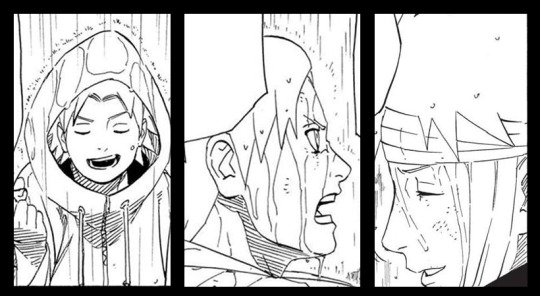
Also available in Russian: ссылка на русский перевод
Although Yahiko is arguably the character who appears “less” among the Ame Trio - naturally, for dying first - he takes up significant part of the flashbacks he appears in. Jiraiya, Nagato, Konan; even in Obito’s memory of the Ame Trio - which serve the plot purpose of showing how Obito started manipulating Nagato - he spends most of the flashback interacting with Yahiko. Yahiko was extremely remarkable to all the people who met him, there is no doubt that Kishimoto took every opportunity he had to tell us he was a very important character.
Something I find very interesting about Yahiko is how easily he could be a villain; he has many of the personality traits of of classical villains. This is not accidental - in Chapter 372, when Jiraiya finds and confronts Konan, his memories of the Ame Orphans lead him to believe Yahiko was the one who first turned evil (in their conversation, Konan never clearly explains whose ideology they have embraced; it’s very implied Jiraiya was inclined to believe that was Yahiko).
This is built purposefully to confuse the audience regarding Pain’s identity as the one who possesses the rinnegan is Nagato; one has the “villainous” personality, the other has the power.

Of course, we all know Yahiko is not a villain, even though he could easily be. Yahiko’s most powerful personality trait is his ambition; this trait is the one that will always surpass the others.
Yahiko is a survivor; we are shown repeatedly that he would do just about anything to to keep alive (and Nagato and Konan with him). We are shown some of his big and most drastic actions like stealing, but minor details like cooking, gathering supplies and stabilising a house for him and Konan - taking from the story and Nagato’s conversation with Jiraiya, it’s safe to assume Yahiko was the mastermind behind all the actions that allowed them to survive as children. Yahiko knew they needed power to survive, and we’re shown in the anime their journey to find Jiraiya and how he quickly learned to navigate in the warzone by being able to put himself in the shoes of his “enemies” and think like they did. Yahiko always had an extremely clear sense of what he wants and how to get there.
He is also a natural leader; we can’t say for sure how much of his leadership is actually his nature and how much it comes from needing to step up as the leader of the trio, given how Nagato and Konan have more passive personalities. The fact is, by the time Yahiko dies, he has been acting as a leader for more than half os his life; giving orders and being in control is his comfort zone. He will have control and boss others even if they don’t agree with him, which is clearly stated when he tells Konan he believes Nagato is the one who will bring peace; he put Nagato in that position regardless of Nagato’s opinions - Konan will support Nagato and not him, regardless who she thinks is the “bridge to peace” (Chapter 509).
In that particular flashback of Jiraiya, there are two classically villainous traits shown: the first is anger; it’s implied that Yahiko is a kid full of anger and hate, but in fact, he is a very emotional and sensitive person - in that, he is very similar to Nagato - although unlike him, Yahiko will almost always express his feelings. He’s angry because he’s in pain and won’t conform to his fate as a victim of a poor country. The second one is both his ambition and megalomania: He will change the country, no matter the lenghts he has to go through.

Another strong trait of Yahiko’s thought process is that ends justify the means. This is proven by many of his actions; to survive, he will steal; to defend others, he will put his own life at risk - the ultimate proof of this is sacrificing his life to save Nagato and Konan from Hanzo. They are the ones who must survive no matter what; no matter if he dies. Although the famous “the end justify the means” sentence is usually associated with Machiavellianism, Yahiko doesn’t display the other traits needed such as manipulativeness and indifference to morality to classify him as a machiavellian person.
Yahiko could easily become a “villain”; he has unbreakable ambition and he’s willing to go to extreme lengths to get what he wants regardless of the opinion of those around him. I could easily say just about the very same about Obito, Madara and Orochimaru with a few changes here and there; I could even describe adult Nagato like that.
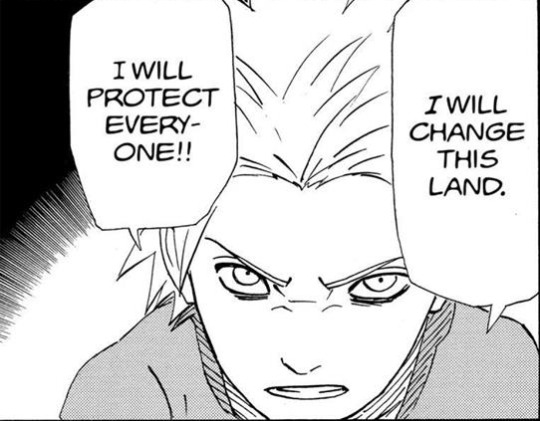
Seeing this particular scene in Jiraiya's memory, his ambition and anger and a "well-intentioned world-domination" goal are enough to convince the reader to believe Yahiko is Pain, even before seeing his appearance. It's notable that Nagato doesn't reply anything while Yahiko is screaming at him, highlighting his more passive personality.
You, reader, must be rather shocked at what I'm saying, because Yahiko is the only one who was never evil among the three of them; in fact, the others turned evil because of his absence. Yahiko is such a special character because he was all those classically villainous traits, the key to his character lies in why he never turns evil despite all of that.
Ambition is the trait that will rule above all; but his vision comes second in command. We are shown Yahiko is a very sensitive child, he cries a lot, he's easy to anger because he's overwhelmed by the situation he finds himself in. In the same flashback that gives the audience all the reason to believe Yahiko could be Pain, Yahiko himself admits inflicting pain on others wouldn't work as a solution.
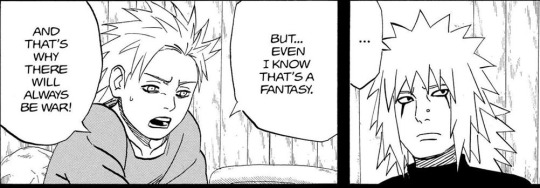
The very fact that Yahiko wanted help from the very people who were destroying his country and were directly or indirectly responsible for him being an orphan (that is, foreigners) shows how the end goal was more important to him than the mean of how to get there; Nagato's initial distrust was the feeling most people would have in their situation, which shows another difference between their thought process; Nagato holds grudges (he could accept Jiraiya individually, but not Konoha, and he couldn't ever get over his parents or Yahiko's death) whereas Yahiko doesn't ever let any past event, situation or prejudice come between him and the goal he wants to achieve.
But ambition, vision and idealism (which I have not mentioned yet) are all traits he also shares with villains.
What makes Yahiko different from other villains, especially Nagato, is that he develops an amazing emotional intelligence to deal with the information his sensitivity gathers from the world.
Yahiko was extremely hopeful, positive and emotionally intelligent, all characteristics he shares with other heroes like Naruto. Throughout his life, the "classically villainous" characteristics of his childhood were outgrown by the "classically heroic" traits that gained strength overtime. Yahiko walked away from the evil path he could have easily taken by confronting his "villainous" traits.
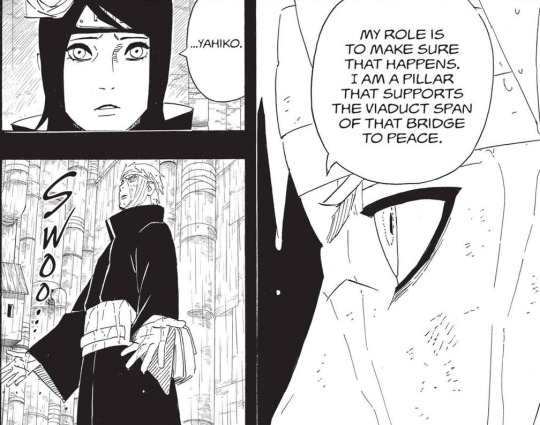
It was through the use of emotional intelligence that Yahiko dismantled the initial megalomania and revengfullness he displays in both Jiraiya's and Nagato's childhood flashbacks. It's important to highlight that Yahiko's "Savior Complex" was something that stayed with Nagato long after Yahiko no longer believed only a single powerful person could force peace upon others. Yahiko "grew out" of his childish megalomania - Nagato did the very opposite when absorbing many of Yahiko's characteristics after his death.
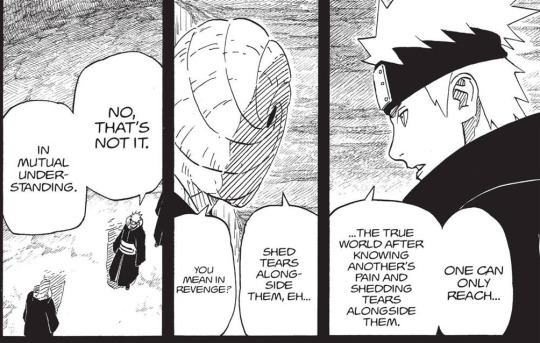
His emotional intelligence can be clearly seen in Obito's memories of him in Chapter 607; in that same instance Yahiko was one of the few characters to rule out the idea of the masked man being Madara. Yahiko was not especially powerful or intelligent, so he rellied heavily in taking accurate conclusions from his observations of the world.
Another sign of Yahiko's emotional intelligence is his mirroring of Jiraiya's behavior - although it may be first seen as something done just for comedy, it shows how Yahiko was eager to understand other people - mirroring is a display of empathy. The natural inclination he had to understand other people led Yahiko to develop his peaceful philosophy, and was also used for him to gather allies (as shown in the anime).
It was both his emotional intelligence and his vision that kept him from becoming arrogant (and doing things like stealing Nagato's rinnegan to himself, as Jiraiya considered plausible). Whereas villains will usually harvest power for themselves, Yahiko knew that the key to the success of his plans didn't depend solely on him and his actions. He had to support others and believe in them. Understanding the value in community and extreme loyalty was a value Yahiko and Konan shared - a value Nagato also had, which was eventually displaced by other traits. It's important to note how Nagato and Konan perceive their memories of Yahiko differently; of course their flashbacks serve plot purposes, but they also show completely different aspects of his personality, and these differences in perception reflect the own values of Konan and Nagato.
Although his ambition, energy and protectiveness are displayed in both of their memories, other characteristics vary in intensity.
In Konan's memories, Yahiko is much more kind and calm, happy but also introspective. In her childhood memories, he appears more joyful and carefree - as an adult, it's shown how he is hurt by the war, how understanding has made him kind and and how he wants to protect his comrades both physically and mentally. In Nagato's memories, he appears much more angry and harsh in comparison - the anime even takes an effort to "soften" some of his actions; in the anime Yahiko gives back some of the stealing and also prays for Chibi in his death (instead of just scolding Nagato for crying and mourning as he does in the manga).
I don't know how manga to anime adaptations work but it's possible that, due to the difference in pace between manga and anime, Studio Pierrot realized Yahiko would come across much more "evil" if he wasn't softened - and I like the adaptations because it makes Nagato's memories less different than Konan's; all they did was add moments foreshadowing a much kinder personality Yahiko would display on the chapters later on.
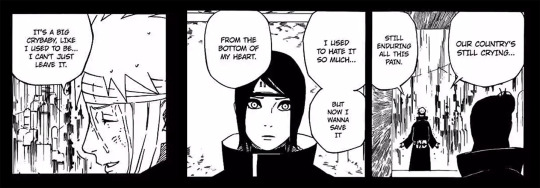
(Edit: I added this image from chapter 509 to better illustrate Yahiko's emotional intelligence using an actual canon moment where Yahiko himself reflects on his past feelings and how they changed as he grew up. I really like this chapter, and I think it's nice how soft and caring Yahiko behaves towards Nagato in Konan's flashbacks, worrying about his injuries and telling that "it's ok" and encouraging him to rest, as opposed to Nagato's own flashbacks that show younger Yahiko screaming and scolding him for behaving like a "crybaby" and "victim" while they were all struggling to survive. I think it's important to consider the scenarios of those flashbacks; Nagato's flashbacks find the characters all recently traumatized, while Konan's find them in a much more stable and safe period of their lives).
Yahiko was the first among the three to understand that the pursuit of "justice" would only result in more conflict as one's noble justice could be seen as mere acts of vengeance by another. All the Ame Orphans knew in their lives was war, suffering and trauma, so the decision to pursue a different path away from violence could only come from a person who could look inside their own heart without the fear of seeing ugly things and confront their feelings.
Yahiko's unshakable hope on his dream of bringing peace was a result of his ambition, his vision and emotional intelligence. His sensitivity led him to become a kind, caring person, who avoided violence as much as he could. We know he was extremely loyal to his ideals, preferring to sacrifice himself and die instead of giving up the peaceful philosophy he had established for the Akatsuki to fight Hanzo. The extreme loyalty and the will to sacrifice anything for that was another trait he shared with Konan.
Although I consider Yahiko's vision to be one of the pillars in his personality, he was also extremely naïve. Yahiko's hopefulness and faith in his dreams and plans were not countered by opposite personality traits like being cynical or hesitant. The first time we see Yahiko being naïve was at the very idea of approaching the Sannin and begging for training, which could have easily ended with them all killed (or, more likely, just ignored). Unfortunately for Yahiko, his biggest flaw was not putting limits to how much he believed his ideals, leading him to fall in a trap he could have easily avoided - I left this trait for last because the anime makes Yahiko's willingness to believe Hanzo a key reason for falling on his trap, even though the manga never shows evidence for that and only implies Yahiko's innocence by Nagato's perception of them being "still children." However, I still think it's fitting for someone who displayed early signs of megalomania to have such naïvety.
Other traits that were not mentioned are less about his ideals and more about his nature; Yahiko is also naturally expansive, friendly and unafraid- these traits help him to become both the trio and Akatsuki's leader. In Chapter 509 Konan mentions he was adored by the rest of the Akatsuki, and it's very implied in the manga (and shown in anime fillers) he lead the Akatsuki with a egalitarian philosophy, not abusing his positon as leader through authority, which is another important trait of his personality; Yahiko may be bossy and unreceptive to challenges on his orders, but he is not comfortable with hierarchy and the idea of some people acting as if they were better than others.
I won't talk much about Yahiko and Konan's romance as I don't believe "being in love" can be a part of someones personality, and I don't believe his decision to kill himself to save her and Nagato was influenced by being in love. His decision to sacrifice himself comes directly from his “ends justifying the means” logic, even if in that particular case the survival of Nagato and Konan is the end which can be justified by the loss of his own life.
I do believe, though, that there are many reasons why they could be attracted to each other and I'll highlight specially their loyalty. Yahiko and Konan are both extremely loyal people; Yahiko is loyal to his ideals, Konan is loyal to what she considers "her own'' - her friends, her people. They are also people who are full of faith in the things they believe in; we are never shown Yahiko having doubts on his plans, as well as we never see Konan ever doubting the capability of the people she supports. People who share such characteristics of loyalty and faith will find great comfort in each other, creating a positive circle of both giving and receiving love and support.
Yahiko's expansive and dominant personality, as well as his positivity and hopefulness contrast immensely with Konan and Nagato's passiveness and melancholy. He is shown to be a person who could deal with his pain and his traumas, and was likely the biggest emotional support of the other two; as he himself said, he had hopes and dreams, his dreams became Nagato and Konan's dreams. His death left an immense void that could not be filled with positive, healthy thoughts and feelings, as Nagato and Konan always relied on his hopeful ideals.
The very traits that could have easily made him a villain are the same ones which lead him to achieve his and the trio's survival. Yahiko's personality exists in a delicate ballance between many "classically villainous" traits and the abundance of other solid "classically heroic" foundations.
By taking a complete look at his character it's easy to understand why his death was something really, near-impossible to recover from given the circumstances, and why the love and respect they felt endured so long after his death.
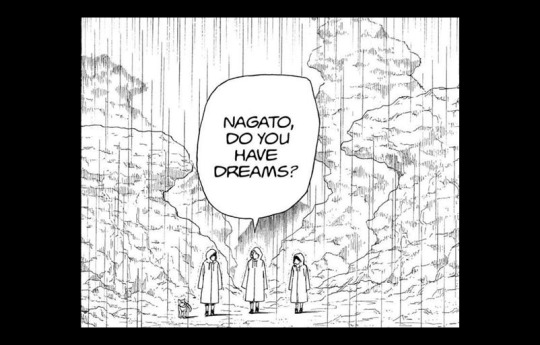
85 notes
·
View notes
Text
Character Analyst of Ozai by Villains Wiki
"After all these years, I can finally see you, Ozai. You're just a small, small man trying with all your might to be big. Your heart is so small, you've no room for your son, or your daughter, or your brother... or even yourself. Goodbye, Ozai.„~ Ursa confronts Ozai about his true nature after she had enough of his tyranny.
“I finally have you, but I can't get you home because of this blizzard. (*Stands up and looks outside the cave*) There's always something. Not that you would understand. You're like my sister. Everything always came easy to her. She's a firebending prodigy, and everyone adores her. My father says she was born lucky. He says I was lucky to be born. I don't need luck, though. I don't want it. I've always had to struggle and fight and that's made me strong. It's made me who I am.„~ Zuko describes his relationship with his father, Ozai, to Aang in comparison to his father's relationship with his sister, Azula, though Aang did not hear him.
Ozai was tyrannical, cruel, manipulative, sadistic, ruthless, blasphemous, duplicitous, harsh-tempered, arrogant, vengeful, greedy, domineering and insatiably power-hungry. He exhibited these traits from an early age, and Iroh noted that they stemmed from a deep-seated pathological psychology. According to him, Ozai lacked empathy, was "not the understanding type", and did never regret, forgive, or change his mind about anything. Believing morality to be a sign of weakness, Ozai found peace and kindness laughable concepts and despised those who followed moral principles. As such, he possessed little to no empathy and rarely showed any interest in the feelings of others.
This behavior was strongly influenced by his obsession with control and in order to achieve total control over the Fire Nation, Ozai was even willing to sacrifice his own family. When ordered by Azulon to kill Zuko so that he would know the pain of losing a son, Ozai admitted to Zuko that he would have gladly carried out the murder had Ursa not interfered. Eventually, he murdered his own father in order to usurp his brother's birthright and become Fire Lord. Similarly, he did not hesitate to sacrifice his subordinates if that meant he would obtain more power. As a result, Ozai supported the idea of sacrificing new recruits to defeat a powerful Earth Kingdom battalion so he could get closer to controlling Ba Sing Se. Likewise, he decided to use the power of Sozin's Comet to destroy the Earth Kingdom without standing still with the human loss that would mean. Despite that, Ozai did believe that a Fire Lord's duty was to protect his people, though he reasoned that was because they were extensions of his divine will as Fire Lord; by attacking them, an opponent attacked him. The ultimate expression of his obsession with control was his aspiration in life to conquer the entire world.
Nevertheless, in his younger years, Ozai showed limited care and compassion for his own family. Despite their strained relationship, Ozai and Iroh were closer while they were still in school, though the latter distanced himself from his brother when he realized that he had a "heart of ice". When Ursa begged him to spare her former lover, Ozai complied to the request after being called "my love" by his future wife. When he planned to cast his infant son from the palace, Ozai gave in after Ursa and the Fire Sages pleaded with him to give Zuko a chance. Ozai believed that he attempted to be a good father in his early years, a view shared by both Zuko and Azula. However, his pride, anger, and lust for power degraded his relationship with his family. He believed skill and accomplishment determined worth, which allowed the naturally cruel, cunning and talented Azula to rise to the position of his favorite child, while he ignored or psychologically abused Zuko. He had no qualms about making Zuko's life miserable just to get back at Ursa for snapping at him that she wished that Zuko was Ikem's son, rather than his. While his relationship with Zuko had always been tense, thenceforth Ozai began to torture Zuko with his perceived inferiority, saying that Azula was "born lucky", while he was "lucky to be born". After his wife's banishment, he continued to be psychologically abusive toward both of his children and physically abusive toward his son. When Zuko was thirteen, Ozai burned his face and banished him from his country, simply because Zuko spoke out of turn during a war meeting, an action for which he never showed any remorse and merely claimed it to have been a lesson in respect. He only acknowledged Zuko when he helped his sister conquer Ba Sing Se and when he "killed" the Avatar. Eventually, Ozai attempted to kill Zuko when the latter announced his intent to join the Avatar, thereby defying his father. On the other hand, Ozai raised Azula to become his future heir, expecting nothing less than the best from her, which placed a great amount of stress on her and forced her to become a perfectionist. Ultimately, it was the environment in which Ozai raised Azula, where fear, intelligence, tyranny, destruction, power and perfection were the only reliable truths, that set the groundwork for her total mental collapse.
However, despite his behavior toward his children, Ozai appeared to be remarkably forgiving of failure for certain people, such as War Minister Qin and Zhao, who retained their positions and, in Zhao's case, was repeatedly promoted, despite repeated failures and bungles. Nonetheless, he saw his subordinates as expendable and replaceable, having no tolerance for those who failed to impress him, such as Kunyo or Vachir.
By the time Ozai crowned himself Phoenix King, he began to exhibit extreme megalomania, claiming to own the Earth and to "have all the power in the world".
"Do you think being Fire Lord is easy?! The throne comes with many pressures, and those pressures will change you! But if you can stand the heat, you'll become something more. Of all the people in the world, I have the wisdom you need, the wisdom of experience! Be honest with yourself, Zuko – Do you really believe you can handle it all on your own?"―Ozai questions Zuko about the challenges of being Fire Lord.
After being stripped of both his bending and his throne, Ozai apparently still retained his domineering personality, as he casually lectured Fire Lord Zuko when he came to visit Ozai in jail. However, he would develop a calmer, more logical attitude toward life as he thought that Aang's belief of maintaining the four separate nations would only halt progress. This is apparently true as Yu Dao, a city that combined the effort from citizens of both the Fire Nation and the Earth Kingdom, grew from a small village to a very developed area. As Zuko sought out Ozai for advice, through their discussions, it was revealed that Ozai believed that good and evil, and even strength and weakness, were meaningless concepts. He believed that the only right and wrong were what he, or more accurately, the Fire Lord, decided, due to his divine right to rule. Any choice he made was the right one, simply by virtue of it being his choice, and that indecisiveness and attempts to guide oneself by moral principles were signs of weakness, traits he despised in Zuko.
Ozai | Villains Wiki | Fandom
#avatar#avatar the last airbender#fire nation#fire nation royal family#fire family#fire lord ozai#fire lord zuko#fire lady ursa#fire lady azula#uncle iroh#ozai
20 notes
·
View notes
Link
LETTERS FROM AN AMERICAN
September 15, 2021
Heather Cox Richardson
Today’s news can wait for tomorrow. Tonight, a thank-you.
Exactly two years ago today, after about a six-week hiatus during the summer, I wrote a Facebook post that started: “Many thanks to all of you who have reached out to see if I'm okay. I am, indeed (aside from having been on the losing end of an encounter with a yellow jacket this afternoon!). I've been moving, setting up house, and finishing the new book. Am back and ready to write, but now everything seems like such a dumpster fire it's very hard to know where to start. So how about a general overview of how things at the White House look to me, today....”
I went on to explain that the chair of the House Intelligence Committee, Representative Adam Schiff (D-CA), had written a letter to then–acting Director of National Intelligence, Joseph Maguire, on Friday, September 13, telling Maguire he knew that a whistleblower had filed a complaint with the inspector general of the intelligence community, who had deemed the complaint “credible” and "urgent.” This meant that the complaint was supposed to be sent on to the House Intelligence Committee. But, rather than sending it to the House as the law required, Maguire had withheld it. Schiff’s letter told Maguire that he knew about the complaint and that Maguire had better hand it over. Schiff speculated that Maguire was covering up evidence of crimes by the president or his closest advisors.
Readers swamped me with questions. So I wrote another post answering them and explaining the news, which began breaking at a breathtaking pace.
And so, these Letters from an American were born.
In the two years since then, we have lived through the Ukraine scandal—the secret behind the whistleblower complaint in Schiff’s letter—which revealed that then-president Trump was secretly running his own foreign policy team to strong-arm Ukraine into helping the president’s reelection campaign.
We lived through the abrupt withdrawal of U.S. troops from northern Syria in early October 2019, leaving our former Kurdish allies to be murdered by Turkish troops. ISIS freed compatriots from jails and launched new attacks, and Russian troops moved into the positions we had held in the region.
We lived through the impeachment hearings, the trial of former president Trump for abuse of power and obstruction of Congress, then the president’s acquittal on those charges and his subsequent purge of career government officials and their replacement with Trump loyalists.
Then, on February 7, just two days after Senate Republicans acquitted him, Trump picked up the phone and called veteran journalist Bob Woodward to tell him there was a deadly new virus spreading around the world. It was airborne, he explained, and was five times “more deadly than even your strenuous flus.” “This is deadly stuff,” he said. He would not share that information with other Americans, though, continuing to play down the virus in hopes of protecting the economy.
The pandemic, more than 660,000 of us—1 American in 500—have not lived through.
We have, though, lived through the attempts of the former president to rig the 2020 election, the determination of American voters to make their voices heard, the Black Lives Matter protests after the murder of George Floyd, the election of Democrat Joe Biden and Vice President Kamala Harris, and the subsequent refusal of Trump and his loyalists to accept Biden’s win.
And we have lived through the unthinkable: an attack on the U.S. Capitol by a mob determined to overrule the results of an election and install their own candidate in the White House. For the first time in our history, the peaceful transfer of power was broken.
Rather than disappearing after the inauguration of President Biden, the reactionary authoritarianism of the former president’s supporters has grown stronger. Senate Republicans acquitted Trump for a second time in his second impeachment trial-- this time for incitement of insurrection-- and in Republican-dominated states across the country, legislatures have passed laws to suppress Democratic voting and to put the counting of votes into partisan hands.
We have seen the attempts of Biden and the Democratic-controlled Congress to move America past this dark moment by making coronavirus vaccines widely available and passing the American Rescue Plan to rebuild the economy. We have watched the U.S. withdraw from the longest war in our history, losing 13 military personnel in the exit from Afghanistan that brought out more than 130,000 evacuees.
And we are, today, watching the fight over the survival of our democracy.
If you are tired, you have earned the right to be.
And yet, you are still here, reading.
I write these letters because I love America. I am staunchly committed to the principle of human self-determination for people of all races, genders, abilities, and ethnicities, and I believe that American democracy could be the form of government that comes closest to bringing that principle to reality. And I know that achieving that equality depends on a government shaped by fact-based debate rather than by extremist ideology and false narratives.
And so I write.
But I have come to understand that I am simply the translator for the sentiments shared by hundreds of thousands of people who are finding each other and giving voice to the principles of democracy. Your steadfast interest, curiosity, critical thinking, and especially your kindness—to me and to one another—illustrates that we have not only the power, but also the passion, to reinvent our nation.
To those who read these letters, send tips, proofread, criticize, comment, argue, worry, cheer, award medals (!), and support me and one another: I thank you all for taking me along on this wild, unexpected, exhausting, and exhilarating journey.
Notes:
https://www.washingtonpost.com/health/interactive/2021/1-in-500-covid-deaths/
LETTERS FROM AN AMERICAN
HEATHER COX RICHARDSON
#history#Letters From An American#Heather Cox Richardson#American Democracy#human rights#voting rights
5 notes
·
View notes
Photo

AUTHOR REC:
creamcoffeelou / @2ofusmp4
Be sure to show some love by leaving kudos and comments!
last blues for bloody knuckles (34k)
“Hi, love,” A too-familiar voice greeted him from the other side of the door. He had a cigarette dangling from his lips that he brought between two fingers as his eyes raked over Louis.
All Louis could do was stare, wide-eyed at the alpha that he’d left behind so many years ago.
“Harry?” His voice felt far away, like it wasn’t him that was speaking. On the other side of the door stood the one man he never thought he’d see again, and maybe the only man he never wanted to see again. A few steps behind him stood Liam and someone else he didn’t recognize, with guns tucked into their front pockets.
“I need you to come with me.”
OR
Styles was a name everyone knew. It had evolved into something of a fairy tale, a far away problem that normal people didn’t have to deal with. Louis never thought he’d find himself falling in love with him. When he finds himself pregnant with Harry’s child, he knows he has to leave the life, and Harry, behind. For her sake.
He never expected Harry to show back up on his doorstep five years later.
A mob au.
Adore You (23k)
When they’d first come into this lifestyle, the being in their roles in their day to day lives, Louis had struggled with it. He’d found it hard to distinguish between what Harry was doing because he thought he had to, with Louis as his dominant, and what he wanted to do just because of them being partners.
Being ‘twenty-four-seven’ in the traditional sense wasn’t exactly realistic in their life, no matter how much they tried to make it work. They could do small things within their power dynamic, they could try their best to keep it going, but more or less, it wasn’t a constant thing. Harry called it submission with weekends and bank holidays, and it worked for them.
As different as it was from what he expected, no matter what, in the end, it worked for them – and that was all that mattered.
“Can I… take care of you?” Harry had asked, his eyes looking everywhere but at Louis. Louis had just turned twenty-three, they’d been exploring things, doing new things for years, and Harry still managed to surprise him. “Like… Just do things for you like you take such good care of me.”
OR: A canon-compliant fic where Harry wants nothing more than to take care of Louis.
Running In The Shadows (43k)
Harry had a plan for his life. Work his dream job, raise his family, and settle down one day. He thrived in the ordinary. But when tragedy strikes, he has to see exactly how far hes willing to go to help the person he cares for most.
Louis was never a part of that plan.
technicolor (81k)
When the small town of Twin Lakes begins experiencing a string of serial murders, a team of detectives is called in to help. Louis is the head of the team and meets a hard-headed psychic who everyone else seems to believe is the one who will solve the case.
Louis isn't so sure.
OR
The slow-burn, hate-to-love, crime au where Harry is a psychic, Louis is a detective, and the world is against them.
Still Standing Still (44k)
Louis has long since been following the same schedule, the same program, the same everything. He works hard towards his goals and gives everything to those that mean the most to him. Harry was never a part of the plan, but Louis finds he loves unplanned changes.
Earned It (5.4k)
There’s something so uniquely captivating to being on stage - to being the center of attention. Louis has always craved it, always craved the feeling of being desired by all only to have his own pick at the end of the night.
He knows people come to see him specifically - has been told time and time again - and maybe that’s why he’s so in love with what he does. He knows he’s wanted and he loves being able to manipulate the attention of the men and women sitting in the crowd around him.
Break Me Dow, Build Me Up (16k)
America, as it’s been told, is the world of riches. Men and women alike can come to the land of the free and achieve the American dream, regardless of their background. He wanted nothing more than to create a better life for his sisters, for himself, and perhaps for his future. Harry Styles was never a part of the plan.
[or: Louis moves his family to America to try and find a better life. Harry finds him instead.]
Just A Whisper (11k)
Strange things have happened around the castle since Louis was young. No one has ever been able to explain them and they've long since gone ignored. As the hauntings become more frequent, Louis finally reaches his last straw and calls a professional to help him.
Ready To Run (11k)
After being left at the alter by his boyfriend of five years, Louis goes on a vacation to try and clear his head and fill the empty spaces in his heart. On the way, he meets a new group of life-long friends, and maybe a little more than that.
Just To Feel (4.1k)
Reason #17: Your car's already at their place and you're too lazy to move it.
When he wakes up, his back hurts, his head is pounding, and his mouth is extremely dry. There’s too much light around him and he doesn’t remember falling asleep at all the night before, let alone getting home. But as soon as he opens his eyes, he realizes very quickly that he’s not home.
He’s managed to fall asleep on the floor of Harry Style’s flat.
The Brightest Star Shines Through The Dark (16k)
Harry and Louis build their life together from the beginning - but even losing everything can't tear them apart.
What A Feeling (2.9k)
“You know I don’t kiss and tell.” Louis says with a slightly forced laugh.
“Yeah, cause there’s nothin’ to tell!” Liam replies with a grin, getting a cackle from Niall, and making Louis’ face flame. He can feel Harry’s soft chuckle, just because their bodies are touching.
“Like you have room to talk, mate.” He bites back, but all three of them are still laughing. He really needs to get laid.
Across The Lines (28k)
With a camera in hand, Louis sets off on the road trip of his life to explore the most famous haunted houses of the UK. Things don't exactly go to plan.
End Game (54k)
Harry styles is the most feared man in London, notorious for always getting everything he wants. All of that changes when Louis comes around and opens his eyes to a new, beautiful side of the world.
Beneath These Sparkling Lights (Forever you’re mine) (5.1k)
"After years of being called a couple teasingly by both our families and friends alike, I know it was nerve wracking for the both of us when it finally actually happened. But for our entire lives we’ve always been HarryandLouis, never apart, whether we called ourselves best friends or best friends and fiancés or now best friends and husbands.” Harry’s smile is so gorgeous that Louis feels a little shake in his knees, “Through everything, the good, the sometimes weird, and the bad, I’m so glad it was you at my side. I know life is ugly sometimes, but you’re the beauty in the fight that is life, for me. My rose to my dagger."
Last Day Alive (42k)
Harry Styles was born to the leader of the Following - the organization that keeps their world peaceful and just. Without the Following, the world would only return to the ways of the Old Times and all of them would come to an untimely end. Or, so he thought, until he meets Louis, the leader of the Rebellion.
Gentle Autumn Rain (57k)
Louis Tomlinson moved to London with a big heart and a big dream. Harry Styles moved to London, fresh out of the police academy, with the hopes of helping as many people as he could in his eyes. When a deranged alpha forces their paths to cross, their ideas of what is meant to be will never be the same.
Down the Field (9k)
Louis, a pro football player of Chelsea, is forced to retire after a severe injury to his foot. After he recovers and is told the news that he'll never play professionally again, he decides to go coach at his old secondary school. Harry, the health teacher, loves to let him know how big of a fan he is.
I Promise (3.5k)
Harry has a promise to keep and a pair of arms to go home to.
[Loosely based on the drowning scene from Dunkirk's trailer. ]
I Chose You (13k)
When he wakes up, the room is much brighter than when he’d fallen asleep. He has to blink the sleep from his eyes and eventually he just tosses an arm over his face to try and ignore the brightness, but then he realizes that the bed has a decent sized dent in it that forms perfectly to his body and he’s comfortable. It’s – weird. He can’t remember leaving the blinds open, and it wouldn’t have made much sense for Zayn to have opened them, either, but he doesn’t think about it. Maybe he just hadn’t realized that he’d had such a nice bed when he’d fallen asleep.
After a moment, he groans and takes his arm away from his eyes and – wait. This is – this is not his hotel room. This is a bedroom.
[Or: Louis wakes up in another life.]
As We Are (48k)
Louis doesn't think much when he's asked to meet up with the alpha of the pack two hours from his own - he figures it's business as usual. But Harry Styles is anything but usual.
Written In The Stars (71k)
It was so different - the complete opposite of everything Louis had ever expected about finally being placed into the real world. Zayn defied every single thing he'd ever been told about vampires, about how he was supposed to be treated. This was nothing like what he'd expected.
[or: Zayn's the third oldest vampire in the world and found himself searching out the company of a human, so he took Louis as his keep. His maker Harry doesn't approve.]
Running (28k)
Louis was never ashamed of who he was - never had been never would be. But he never really was himself.
In The Heat of The Moment (36k)
The first thing that came to Zayn’s mind when he read Liam Payne’s file was that he was certainly, definitely going to die before he was thirty. The word they used in The Office for such a case was reckless; reckless meant that, perhaps, the person wasn’t at fault, but the universe and said person’s energy didn’t happen to match. That made terrible things happen to that person.
Liam Payne was a classic case of recklessness.
[or: A modern times AU where Zayn is a guardian angel and he's been sent down to protect the most reckless human he's ever met.]
40 notes
·
View notes
Text
The Great Reset Demands Firing All Unvaccinated Employees Analysis by Dr. Joseph Mercola
Story at-a-glance
The Great Reset has been called a conspiracy theory by many, despite specific plans published on the World Economic Forum (WEF) website and partnerships between the WEF and global organizations like the United Nations and World Health Organization
An investigative report asserts that the ongoing restructuring of processes that control food and data are upending traditional practices so private corporations have more control and influence than democratically elected government
A part of the Great Reset is a reset of the economy, including jobs. Many across the U.S. are facing unemployment if they do not choose to take a genetic therapy experiment in the form of a COVID-19 vaccine
Employees of six major hospitals in Cincinnati, Ohio, have filed a lawsuit, hoping to stop the mandated vaccine, which health experts are promoting with inconsistent messages, first claiming it does not stop community transmission; yet, requiring it for employment under the guise of preventing the spread of infection
Over the past year and a half, I’ve written many articles detailing the evidence supporting the claim that the COVID pandemic is a ruse to usher in a new system of global centralized governance by unelected leaders, the so-called Great Reset.
The recent release of the House Foreign Affairs Committee report1 entitled, “The Origins of COVID-19: An Investigation of the Wuhan Institute of Virology,” presented solid evidence that many of the “conspiracy theories” about the virus were in fact true. For example, using some intelligence reports and other public documents, the committee found that:2
“… we now believe it’s time to completely dismiss the wet market as the source of the outbreak. We also believe the preponderance of the evidence proves the virus did leak from the WIV and that it did so sometime before September 12, 2019.”
They presented evidence of genetic modification and wrote this:3
“This report also lays out ample evidence that researchers at the WIV, in conjunction with U.S. scientists and funded by both the PRC [People’s Republic of China] government and the U.S. government, were conducting gain of-function research on coronaviruses at the WIV …
In many instances, the scientists were successful in creating 'chimeric viruses' — or viruses created from the pieces of other viruses — that could infect human immune systems.
With dangerous research like this conducted at safety levels similar to a dentist’s office, a natural or genetically modified virus could have easily escaped the lab and infected the community.”
The idea of the Great Reset may feel like a conspiracy theory, especially if life as you know it where you live has not dramatically changed. You still go to work, buy food, go to the gym, go out to eat and attend events. There may be people wearing masks, and you may see or hear news reports about vaccine mandates and vaccine passports, but it hasn’t reached your employer and you may not be personally affected … yet.
But, make no mistake, unless we all do our part to peacefully protest the changes being planned, write to our legislatures, and talk to our neighbors and friends, what is happening in New York,4 France,5 Germany6 and Israel,7 will soon be knocking on your front door.
Does ‘Great Reset’ Sound Like a Conspiracy? It May Be Worse
An article titled, “Welcome To 2030: I Own Nothing, Have No Privacy and Life Has Never Been Better” appeared in Forbes Magazine8 in November 2016. It was written by Ida Auken, a member of the Denmark Parliament9 and agenda contributor at the World Economic Forum (WEF).10
The article was frightening in the simplistic way it describes the dissolution of society as we know it. And, as time marches forward, we see more evidence of what the WEF has proposed as “perfect sense”11 coming true.
Canadian Prime Minister Justin Trudeau suggested in September 2020 what other world leaders have also promoted12 — that the COVID-19 virus, that has killed and devastated the health of many people, provided the world is an:13
"… opportunity for a reset ... our chance to accelerate our pre-pandemic efforts to re-imagine economic systems that actually address global challenges like extreme poverty, inequality and climate change."
More than 20 world leaders came together to suggest, "At a time when COVID-19 has exploited our weaknesses and divisions, we must seize this opportunity and come together as a global community for peaceful cooperation that extends beyond this crisis."14 And while that sounds noble, altruistic and humanitarian, it is the plan for the future that is in stark contrast to the statement.
Ivan Wecke, a journalist from Open Democracy, did a deep dive into some of what lies behind the WEF’s Great Reset plan and found what he called something “almost as sinister hiding in plain sight. In fact, more sinister because it’s real and it’s happening now. And it involves things as fundamental as our food, our data and our vaccines.”15
Although Wecke discounts the plans of the Great Reset to abolish private property, use the virus to solve overpopulation and enslave the remainder of humanity as “nebulous and hard to pin down,” he goes on to illustrate in detail how the fundamental structure of the world that controls food and data, and ultimately humanity, is being upended and restructured so that private corporations have more control and influence than governments.
WEF Calls It ‘Stakeholder Capitalism’
It comes down to “stakeholder capitalism,” which are the magic words that Klaus Schwab, WEF chairman, has been promoting for decades, and is a central theme in the organization's Great Reset plan.16 The concept as Wecke describes it is to transform global capitalism, so corporations create value for stakeholders.17
These stakeholders can be consumers, employees, communities and others. This will be carried out through multi-stakeholder partnerships of governments and private-sector businesses across the globe. As he dug deeper into the concept, it became more apparent that this means giving corporations more power and taking that influence away from democratically elected institutions.
The initial plan was drafted after the 2008 economic crisis and included the vision that governments around the world would be only one influencer in a multi-stakeholder model. When he asked himself who would be the other nongovernmental stakeholders, Wecke only had to look at the WEF partners that meet each year in Davos, Switzerland.
These partners are some of the biggest companies in oil, food, technology and pharmaceuticals. In other words, the companies that could ultimately restructure society and control the supply chain are those that provide everyday necessities. These proposed concepts appear to have started taking shape in a strategic partnership agreement which the WEF signed with the United Nations in 2019.
Harris Gleckman, senior fellow at the Center for Governance and Sustainability from the University of Massachusetts18 calls this move an inroad to creating a place for corporations inside the United Nations.19
The WEF is using the concept of multi-stakeholders to change the current system that countries use today to work together. This multilateral system may not always be effective and may have too many layers of bureaucracy, but Wecke says it is “theoretically democratic because it brings together democratically elected leaders of countries to make decisions in the global arena.”20
Big Tech May Run the Roadmap for Digital Cooperation
What’s really happening here, though, is the move toward placing unelected stakeholders in positions of power does not deepen democracy but, rather, puts decision making in the hands of financially focused corporations. As Wecke points out, this will have real-world implications for how medications are distributed, food systems are organized and how Big Tech is governed.
Under a democratic rule of law, six corporations already control 90% of the news media consumed by Americans. Tech Startups calls this an “illusion of choice and objectivity.”21 How much more propaganda will be thrown in the face of consumers when Big Tech is monitoring and controlling Big Tech?
The year 2030 holds significance for the WEF’s vision22 which is to scale technology and facilitate “inclusive growth.” In the fall of 2021, the UN will bring together the Food Systems Summit to achieve sustainable development goals by 2030.23 Yet, Sofia Monsalve of FIAN International, a human rights organization focused on food and nutrition, told Wecke:24
“’Abandoning pesticides is not on the table. How come?’ asks Sofia Monsalve of FIAN International, a human rights organisation focused on food and nutrition.
'There is no discussion on land concentration or holding companies accountable for their environmental and labour abuses.’ This fits into a bigger picture Monsalve sees of large corporations, which dominate the food sector, being reluctant to fix the production system. ‘They just want to come up with new investment opportunities.’”
Wecke also dug into a long list of participants in the 2020 Roadmap For Digital Cooperation25 and found influencers included Microsoft, Google, Facebook and the WEF.26 The functions for the group appear to be vague, but if the group comes to fruition, it will be a decisive victory for those Big Tech companies that have been pushing to expand their power,27 are fighting antitrust rules28 and are facing accusations of tax evasion.29
The move by the UN and WEF has not gone unnoticed. A group of more than 170 civil organizations have signed an open letter30 detailing why they oppose the plan. At a time when stronger regulations are needed to protect consumers, it appears that the new UN digital roadmap may be seeking less.
Firing the Unvaccinated Is the Start of the Great Job Reset
Finally, Wecke addresses the issue of global vaccine distribution.31 Instead of the World Health Organization, which is “the directing and coordinating authority for health within the United Nations system,”32 being responsible for vaccine access, another initiative was created called COVAX. According to the WHO, COVAX is co-led by the WHO, UNICEF, CEPI and GAVI.33
As a quick reminder, GAVI (the Vaccine Alliance) and CEPI (Coalition for Epidemic Preparedness Innovations) have strong ties with the Bill & Melinda Gates Foundation and the WEF and are connected with large pharmaceutical companies such as Pfizer, AstraZeneca and more.34
The influence these groups have on the global distribution of the COVID vaccine may have been best illustrated when South Africa and India requested a temporary lift on the rules governing intellectual property to increase manufacturing and distribution to developing countries. Wecke reports35 that although the WHO director-general publicly said that he backed a proposal, others in the COVAX initiative strongly opposed it, and it didn’t happen.
There appears to be enough vaccines available in industrialized nations for the WEF to support any and all employees being fired if they choose not to take the vaccine. The National File36 published a tweet the WEF made in May 2021 which said, “Get your COVID-19 jab — or you could face consequences from your employer #COVID19 #JobsReset21.”
Additionally, the WEF had posted an article37 on their website that made a variety of claims about the percentage of companies that would require employees to be vaccinated and juxtaposed mental health concerns and burnout through the pandemic with being unvaccinated in the article.
After intense backlash, the tweet was deleted and replaced with a question, “Will employees be required to get the COVID-19 vaccination?”38 The new post quickly filled with screen shots of the original post.
Two Cities Promising to Fire Employees
Even before the FDA announced their approval of the Pfizer vaccine,39 Cincinnati, Ohio, area hospital systems had announced that starting October 1, 2021, all health care workers and volunteers are required to be vaccinated. Among those participating in the vaccine mandate are the University of Cincinnati Health, Cincinnati Children's Hospital Medical Center and the Christ Hospital Health Network.40
Health care workers in Cincinnati have now filed a lawsuit against six of the hospital systems saying requiring vaccines for employment is unlawful and violates workers’ Constitutional rights. The lawsuit says, "When there was no vaccine, the workers had to go to work. They were heroes. Now that there is a vaccine, they have to get the vaccine or be fired. Now they are ‘zeros.’"41
April Hoskins is a lab assistant at St. Elizabeth Edgewood who has worked for 20 years in family practice and hospital oncology. She told a reporter from WLWT5,42 "You've trusted us this whole time to take care of these patients, unvaccinated, without the proper PPE. And now out of nowhere, you have to get it or you're going to be terminated? Like, something is wrong with that picture.”
August 23, 2021, New York City Mayor Bill de Blasio announced that all public school teachers and staff would be required to have at least one dose of the vaccine by September 27, 2021, or they would no longer have a job. Not soon afterward, the United Federation of Teachers union issued a statement from union president Michael Mulgrew reiterating their desire and priority to keep the students and teachers safe. He went on to say:43
“While the city is asserting its legal authority to establish this mandate, there are many implementation details, including provisions for medical exceptions, that by law must be negotiated with the UFT and other unions, and if necessary, resolved by arbitration."
It Is Important to Point Out the Inconsistencies
This was the second announcement from de Blasio, who first mandated vaccinations for approximately 400,000 employees in the Department of Education, New York Police Department and the Fire Department of New York.44 In tandem with New York, California Long Beach Unified School District also announced mandatory vaccinations, as has Chicago Mayor Lori Lightfoot for all Chicago Public School employees by October 15, 2021.
New Jersey Gov. Phil Murphy also announced mandatory vaccinations or twice-weekly testing requirements for all state employees, effective October 18. It is clear that as different states and municipalities add their own mandates, it’s essential to be aware of what is happening in your local and regional areas, as well as to speak up at public meetings and demand public hearings on the matter.
The mayor of Orland Park, Illinois, a suburb of Chicago, describes an example of how decisions behind closed doors can have a different outcome than those in public.45 He also says what is happening now is about “our processes, Constitutionality and the rule of law.”
The inconsistencies from health experts are deafening. Even the World Health Organization advises people who are vaccinated to continue wearing masks due to the Delta variant because “vaccine alone won’t stop community transmission.”46 Simultaneously, the public is told that everyone needs the vaccine to prevent spread of the infection47 and if you have the vaccine, you can still spread the virus and put others at risk.48
Each person has a responsibility to speak up, share information and ensure that as people make up their minds about vaccination, vaccine passports, civil liberties and the right to free speech, they have all the information they need and not just what’s shared in mainstream media.
To that end, I encourage you to share my articles with your friends and family. As you know, they are removed from the website 48 hours after publication. Please copy and paste the information, with the sources, and share it!
2 notes
·
View notes
Text
Love and Mercy in Islam: Appeal to Mercy
It is patently obvious that those who do not share the same values inherited from the past, or who do not rely on the same sources as us are not likely to appreciate our affliction; nor can they help but be puzzled by our general attitudes.
In fact, for those who view the present and the future from only a materialistic point of view and who deal with life merely in accord with its corporal aspects, it is not possible to feel or taste anything but the transient and shallow pleasures of the body. And, again, according to the same corrupt view, things not related to corporeality or to the body are not worth mentioning. Neither the past nor the future holds any meaning. The past and the future are merely refuges in which those who have lost the present can take shelter. What such people consider essential is the present; they see the rest as being a waste of time. Truly, these people, imprisoned within such a narrow perspective, are not likely to understand such statements as,
“Were you to know what I know, you would seldom laugh, and often weep.” [ Bukhari, Kusuf, 2; Muslim, Kusuf, 1; Tirmidhi, Zuhd, 9; Ibn Maja, Zuhd, 19 ]
Nonetheless, the Sultan of the Words, the Prophet who uttered this hadith, knew well over what he was crying, just as those mature spirits, satisfied only with faith, divine knowledge and love, and prepared with their armament for eternity, also know why they are weeping and of what they are in pursuit. There are many reasons for such people to cry.
As well as belief and finding peace—a problem in which everybody is interested—or the danger of being drowned in disbelief, there is a multitude of problems that need to be solved—social, economic, political, and cultural. There are cases of injustice that are considered to be the root of unease in society. There are rights that need to be reconsidered and redistributed in accordance with human values and along the principles of fairness and conscience. There are our hopes and ideals that are concerned with eternity, and, opposing these, there are antidemocratic obstacles that cannot be contemplated, as well as the propaganda of power. In many areas, emotions still dominate reason, and orders are given in accordance with the recklessness of power. In many parts of the world, human mistakes and acts that are considered to be wrong are still swept away with blood and tears. People, from time to time, are forcefully taken off in the direction of Paradise, or roughly pushed toward Hell, their will power and opinions disregarded. New camps are being formed every day, each team fighting for their perspective or their commandments; every ideology is depicting a life style befitting their principles. Furthermore, people are forced to fit into this narrow portrait and to live accordingly. Throughout the world, in hundreds of places, individual consciences are still being crushed, the will of the community is still being ignored and the eyes of the conscience are still being blinded.
In fact, the shortest way to relieve their pains and to rid them of personal and social repression is to cease interfering with their consciences and to show them how to exist with their own awareness and will. Indeed, only when the mechanism of the conscience is kept alive, and will power and awareness are respected in society, can the people stay human and be directed toward human values. Individuals can only be regarded as true citizens when they exist with their own conscience and will power, thus growing mature enough to help others spiritually. Otherwise, society is inescapably inflicted with various social, political, administrative, and economic problems. A community that is made up of inadequate, inconsistent or patched together pieces cannot be called a nation. Likewise, a mass that appears to be a nation, yet which has deteriorated beyond recovery cannot promise a bright future. If we want salvation as a whole society, it is essential that each and every individual be alert and motivated. The star of the good fortune of our society will appear in a surprisingly comforting manner if we plead for the salvation of others, shoulder to shoulder, with our palms opened to the sky.
The essence of the fundamentals that help us reach the desired maturity is composed of our being aware of the faith with all its peculiar depths, of undergoing pain and effort in our worship, of being moral in all our acts, of being spiritually, consciously and sensuously revitalized, and of weighing everything against the righteousness of the heart.
Enlightened with these, we will transcend the limits of individuality, make demands in accordance with these principles, and be aware of the things that we demand as well. Going one step further, we will be able to connect everything with eternity, and evaluate everything with the supreme criteria. Thus, sharing in all the advantages of humanity, we will be able to voice once again our eligibility to be "in the most perfect form and nature" as the humans we are. I believe that those blessed ones who understand this pivotal point will not only attempt to lead others to the straight path, but will also guarantee their own future.
I feel obliged to restate again that individual projects of enlightenment that are not planned to aid the community are doomed to fruitlessness. Moreover, it is not possible to revive values that have been destroyed in the hearts of the individual in society, nor in the conscience or the will power. Just as plans and projects for individual salvation that are independent of the salvation of others are nothing more than an illusion, so, too, the thought of achieving success as a whole by paralyzing the individual awakening is a fantasy.
In this light, we believe that, having clarified in our individual wills and consciences the fact that everybody has hands of their own, but by joining hands we can solve all the problems with a collective conscience and will power.
With this kind of attitude, we hope to retain, and even to increase, the fruitfulness of our individual lives while presenting to others the elixir of life, and, therefore steadily augmenting our material and spiritual value. To us, the more altruistic a plan or an attempt is, and the more often it is directed for the good of others, the more consistent and promising it is. This is true because what keeps a person alive is the goal of lifting others up. The converse of this is that it is personal interest that kills or paralyzes human beings. Those who waste their lives in pursuit of personal interest are sooner or later corrupted, although they are not necessarily involved in dirty politics. Those who stay alive by inspiring the awakening of others, on the other hand, walk safely providing the elixir of life, in places where all others are being blown around like leaves. And such are the people who have been nominated to "contentment” in this marathon that takes place in both this world and the next.
Over and above the maxim “Desire not for others what you do not desire for yourself,” such people ceaselessly try harder for others so that others will benefit from what these people of heart have already found useful. With the boundlessness of the horizon of such people, they are able to revive the feeling of mercy in the hearts of tyrants. At the same time, they believe that being with the oppressed is the same as being with God, and thus support them.
Living for others is the most important factor that determines the behavior of such heroes. Their greatest worry is their quest for eligibility for such missions, whereas their most prevalent characteristic is that their utmost ambition is their search for God’s consent. When striving to enlighten others, they feel no pain nor do they undergo any shock caused by the delight of enlightening others. The achievements that such people accomplish are regarded as revelations of His holy aid, and such people bow in modesty, nullifying themselves again and again, every day. In addition to all this, they tremble at the idea that their emotions are bound to interfere with the works that they have caused to come into existence, and groan; “You are all I need.”
For ages we have waited impatiently for such blessed hands to transform what can be depicted as “the devastated lands, ruined homes, and remote deserts” into a new realm. And we are determined to wait for many more years with faith, desire, and resoluteness. May the expectation of these pure, compassionate hearts for this Infinite Mercy, not go unanswered.
#allah#god#islam#muslim#quran#revert#convert#convert islam#revert islam#reverthelp#revert help#revert help team#help#islamhelp#converthelp#prayer#salah#muslimah#reminder#pray#dua#hijab#religion#mohammad#new muslim#new revert#new convert#how to convert to islam#convert to islam#welcome to islam
13 notes
·
View notes
Note
Hey Lightning, I was wondering if I could get your thoughts on something. One take that seems to keep returning every once in a while is the "Allura fell for Lotor only after he revealed his Altean heritage," but I know u and others have disproven this many times, which does reassure me. While I love Allura, I definitely think one of her weaknesses was her devotion to Altea and singing Alfor's praises, which sometimes became too much. At the same time, it bothers me when I see some ppl (1/?)
Continuing anon message: “ say that she thought Alteans were superior to all other races, and that when the colony plot twist happened, she became repulsed by Lotor's Galra side, which is why she rejected him. For them, that's why she forced violent memories onto an uncorrupted Zarkon, but somehow "saw the good/redeemed" Honerva, the Altean. I can kind of understand where they're coming from, but for me, it just didn't make sense that Allura suddenly had a change of heart considering for most of s8, she was angry and dead set on going after Honerva. Even with that, I think to a lot of her fans, s8 made Allura so ooc that she became unrecognizable, which hurt to watch. I guess for me it's hard seeing antis and people who don't like her claim that that's just how she is and has always been. Haha sorry for rambling, but I'd love to hear your thoughts on this, since your arguments ease my mind on a lot of things when it comes to Allura :)”
Hi, anon. Wow, thanks for your extended note! I don’t know anywhere in canon that Allura champions Alteans as a superior race. The definition of racial supremacy is a belief that inherent genetic differences between races determine cultural or individual achievement, with social/governmental policies championing intolerance of other races. To get Allura to fit into such a label:
1. A viewer has to ignore or undermine all the evidence available about who the main-universe Alteans really were before main-universe Zarkon’s massacre of them.
2. A viewer has to ignore or undermine how Allura actually responds to a variety of different races in the show, including her own.
So let’s start with issue one. To support an “Allura was a racial supremacist” opinion, a lot of antis (and even non-militant, average viewers) are favorable to the opinion that Alteans as a group, including Alfor, were actually evil and violent colonizer elitists before Galrans killed them off. In other words, they question Altean victimhood, and this allows the militant antis to poison and undermine scenes of a woman mourning her home and her beloved family. And it just gets to be a really unsettling conversation, to listen to someone actually try to justify genocide. They’ll also have suspicions that all of our foundational backstory in the s3 finale was just “cleansed” propaganda from Coran. So if antis can undermine Allura’s entire race and family as corrupt, then they can intentionally undermine any of her canonical statements about or efforts toward peace. Which is hilarious, because this racist tactic applied to Allura is actually what a lot of antis accuse Allura of doing with Lotor.
For the record, I don’t think the show production team actually intended the subliminal messaging/cognitive dissonance that I’m about to discuss. The people who designed and developed this show are fans of robot kitties and aren’t PhDs in social issues. But I think there is a very serious issue about the portrayal of genocide victims that feeds into some very real problems in our world, especially regarding the concept of racial supremacy and conspiracy theories about genocide victims.
VLD tried to play with both genocide politics for edge™ points while ALSO playing with shatterglass theory (shatterglass meaning an AU where the heroes are villains and villains are heroes). Combining these two concepts into the same universe creates some incredibly disturbing subliminal messaging about Alteans that very closely mimics ongoing neo-Nazi propaganda against Jews. Nazis and other anti-Semitists justify their hatred of Jews by equating them as terrible villains out for world domination via some underhanded shadow control of the mass populace. It’s an incredibly malicious form of propaganda, because it works so terribly well. And what do you know, VLD plays right into this kind of propaganda. In the season 3 episode, Hole in the Sky, we’re faced with team Voltron confronting an Altean Empire that was actually evil and out for multiverse domination. And oh by the way, they’re using malicious shadow tech to control a mass populace.
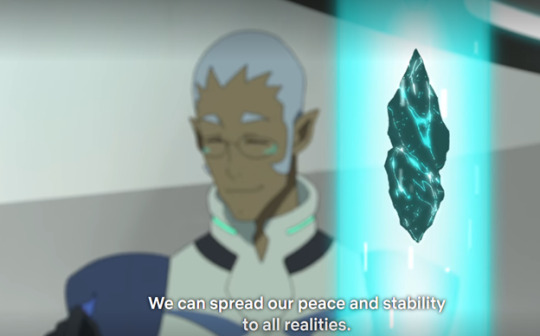
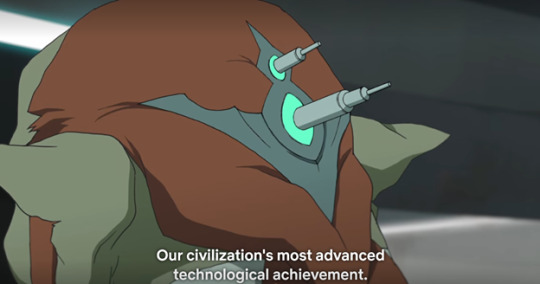

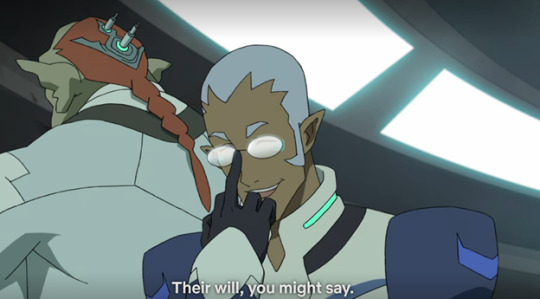
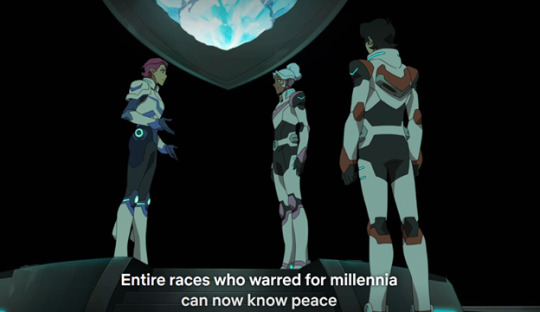


It’s like someone on the production team read the Protocols of the Elders of Zion and then just copied/pasted that incredibly damaging and widely accepted conspiracy theory right onto Alteans for s3 funsies because edge content.
This is incredibly punishing, for the narrative to wave the carrot stick in front of genocide survivors that maybe some others survived—and then to suggest that Alteans were the evil ones all along. A shatterglass twist worked very well in Captain Marvel (2019) for a lot of reasons, for example, but it just doesn’t work well in the VLD universe given that the show explicitly portrays the genocide victims as evil and validates this concept. And this episode unfortunately feeds ongoing cognitive dissonance in antis that if AU Alteans could be so evil…how certain are you that they aren’t in the main universe too? On the reverse side, the main-universe goes out of its way to portray that not all Galrans are evil, and even that Galrans were the primary resistance (BOM). But in this singular episode, we see a united Altean empire. And the only Altean who moves to stand against it once the shine wears off…is Allura. There is no AU Altean actually shown in the Guns of Gamara. So Allura stands alone as an Altean against her own people.
For this reason, this episode doesn’t function very well as a shatterglass AU either, because the moral “flip” isn’t a mirror balance to main universe. The Alteans of the AU world appear as fully united in their evil plans. And then, no doubt, anti-alluras point out other quirky things about main-universe Alteans throughout the show—the violent language-learning system that scares Pidge, and the ancient Altean terraforming technology that Haggar activates, and the fact that Oriande is a hidden place that keeps out the less magical with a violent guardian. These details, when removed from main-universe world building, create a cognitive dissonance about whether main-universe Allura and Alteans were actually genuine in how they depicted respectful “peace and diplomacy.” So anti alluras who believe Allura was a racial supremacist really rely on this s3 episode and these details to uphold their conspiracy theory.
So let’s focus on Allura in this episode, because it says a lot about who she ultimately is as a person, and people have forgotten how she actually responded in this episode. Allura is unquestionably hopeful at the thought that her and Coran might not be the last Alteans alive. Pretty understandable. If I were the last human, I’d be darn excited to find out there’s more of me left, lol. So her experience as a genocide victim initially blinds her to the evilness of these Alteans. You can even see the ache on her face, of how badly she wants to believe their narrative of peace.

So Allura is initially star-struck that she and Coran are not the last Alteans, yes, and that somehow they’ve achieved a “peace.” She is also not afraid to admit that they would be valuable allies in the war:

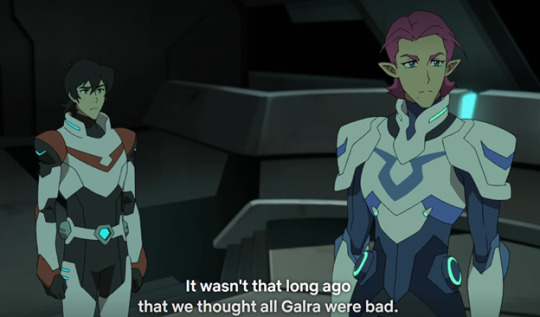
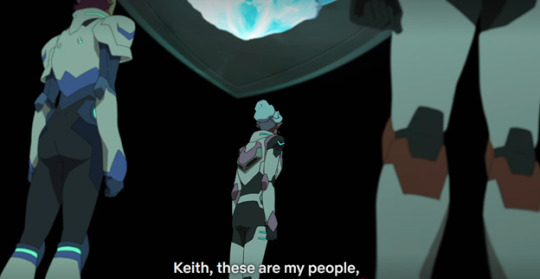
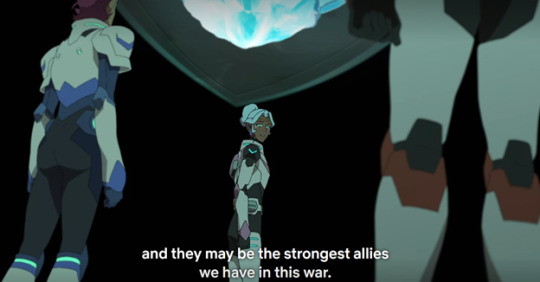
And she’s not wrong there, considering that they have what appears to be extensive military resources and a robot force of their own. But she makes a critical mistake in assuming that “these are my people” means that they share main-universe cultural sentiments. The instant Allura hears Slav (so not someone of her own race) call these Alteans out as actually evil colonizers turning people into slaves, she begins to question the narrative she’s received.
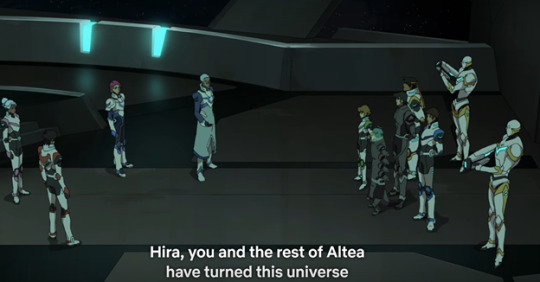
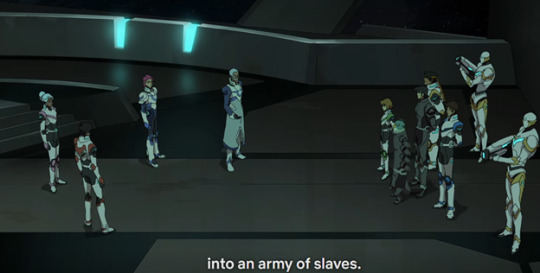


In this instance, she actually affords the Alteans the same courtesy she afforded Lotor—the opportunity to deny the accusations.

But in the AU Altean’s case, they try to turn blame back on other parties. Allura listens to Keith when he grows increasingly fearful of what the Alteans might do to the others, and she tries to plead for actual peace:
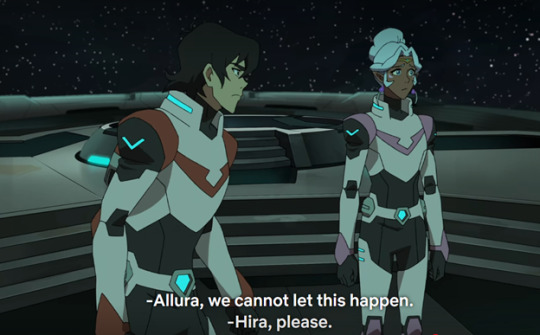



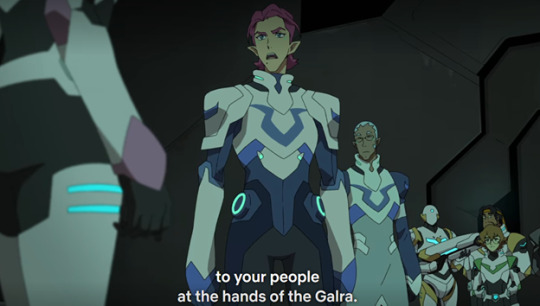
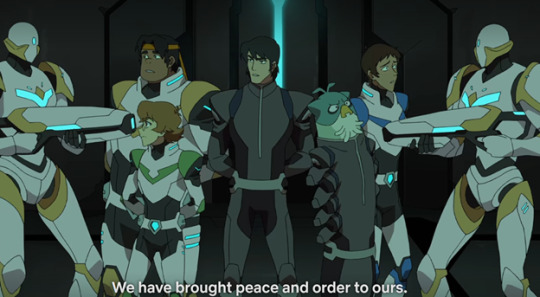
And actually, this is a pretty interesting moment for Allura. She tries to salvage an alliance…until she realizes that their differences are irreconcilable, and that their definition of peace is inherently different from her own. This probably sets the stage for why Allura was so triggered by Lotor talking about peace while also killing people—because she’s seen people misappropriate that term before. And also probably informs why she trusts the information of both Keith and Krolia (both of whom have Galran blood, btw).
Ultimately, Allura turns against her own people. Violently:

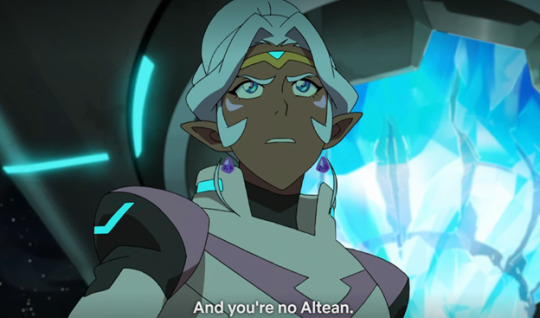

When they get angry about her wanting actual peace, Allura draws a weapon against them and rejects them from her people. This mimics how she spends several seasons fighting an Altean Haggar/Honerva for her crimes, and how she turns against Lotor too.
So case in point here, Allura loves her people, obviously—but she also is holding them to moral standards regarding their behavior, which is something that a genuine racist doesn’t do. As a matter of fact, Lotor is the only person of Altean blood that Allura genuinely bonds with ever again in the series. She’s distant with Romelle, she’s distant with the s8 Alteans… In s8, Allura even says this about Luca, which refers back to her own mistakes she made with initially being star-struck by the s3 AU Alteans who came in “peace”:
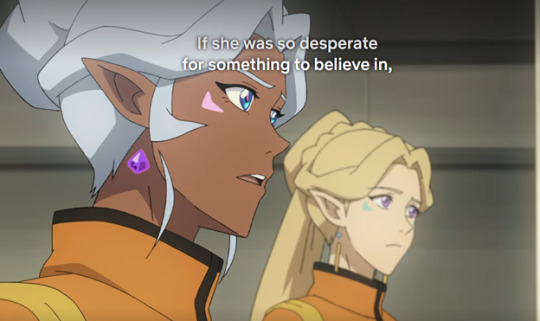
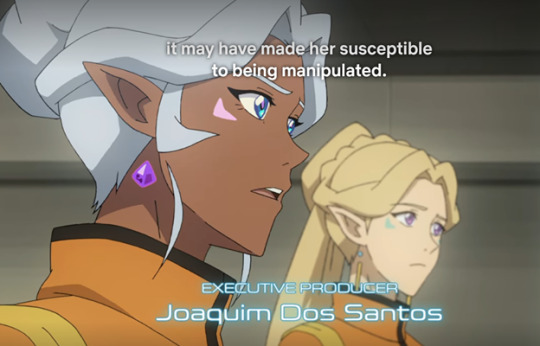
Allura herself had been manipulated in s3, wanting so desperately to not be the last Altean alive that it initially blinded her to how Commander Hira was manipulating her. The plight of the s8 Alteans who are deceived by Honerva is inherently frustrating to her, because she can see herself in them.
Absolutely none of this correlates with Allura seeing or perpetuating Alteans as a superior race. At every turn, her own people continue to disappoint her, and she increasingly and progressively separates herself from them in hopelessness, because they’re so brainwashed that they can’t see they’re just cannon fodder for someone else’s military agendas. Not exactly a ringing endorsement for a superior race, lol.
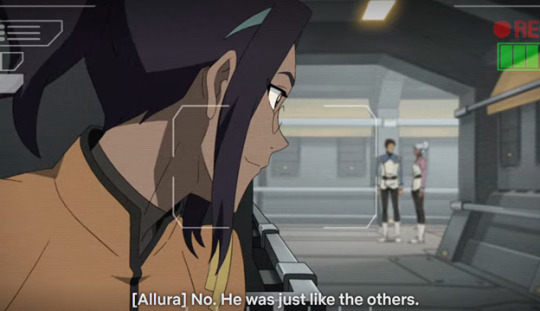

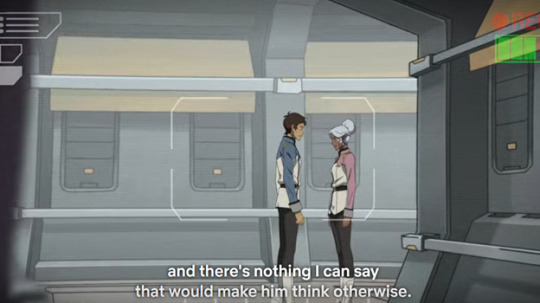
So let’s think about anti accusations here. Allura is a racial supremacist…but she’s arguing against her people who believe unquestionably in Honerva, another full Altean like herself? Nothing about that accusation makes sense with her actions.
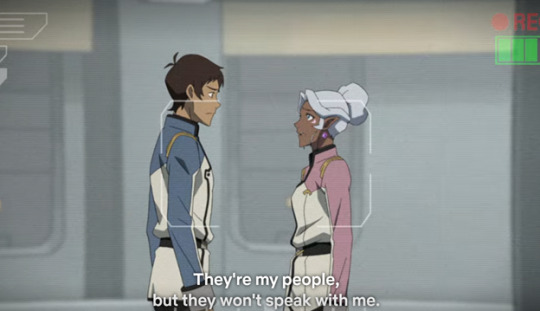
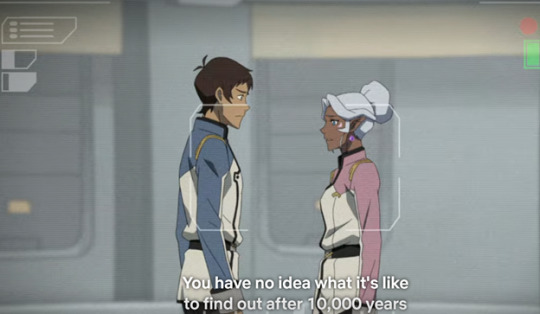


The fact is, consistently from season 3 and onward, Allura is faced with her own people morally disappointing her.
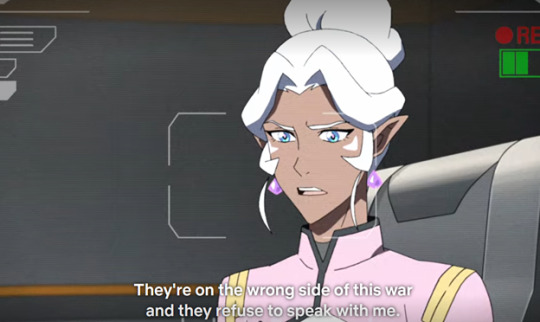
The good news for the s8 Alteans like Tavo is that Allura is able to remove the dark entity Honerva is using to control him. Which allows other Alteans to “wake up” from being manipulated and try to make amends.
Regardless, Allura makes a very clear line that simply being Altean doesn’t make someone “right.” She sees herself fully at odds with her own people who are drawn in by Honerva’s lies. And she experienced well back in s2 (revealing Haggar as Honerva) and s3 (evil AU Alteans) that any given race, including her own, can house people who do bad things.
The fact is, she’s consistently and willingly drawn weapons against even her own people when they didn’t meet her moral expectations. So her response to Lotor isn’t particularly out of line there. She’s repulsed by a moral flaw.
And actually, Lotor himself wouldn’t have known this, but he very oddly echoed the AU Alteans by getting angry that Allura was angry over the means through which he was trying to get peace:
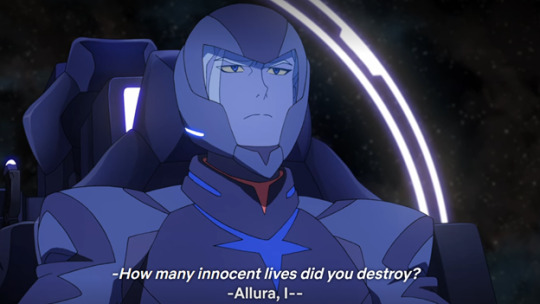


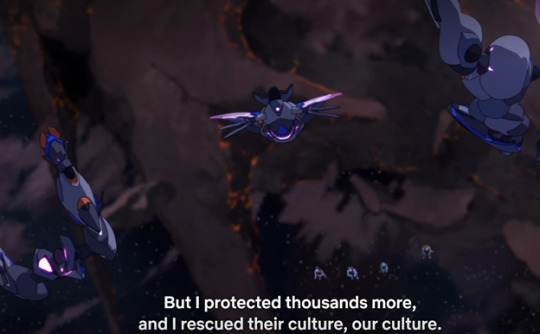

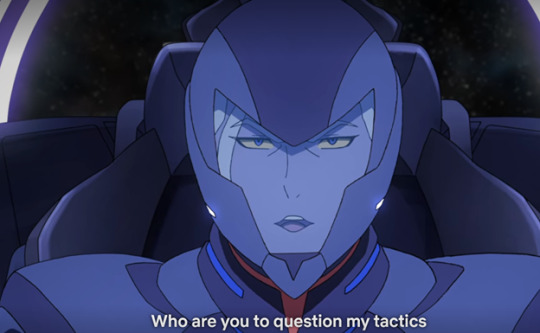
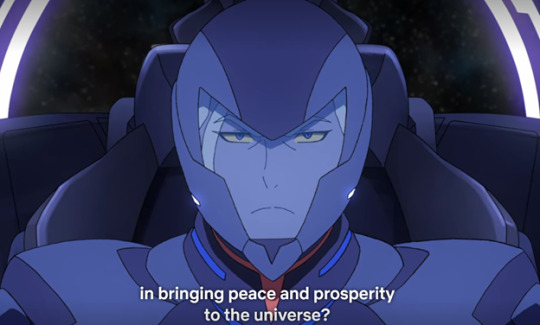
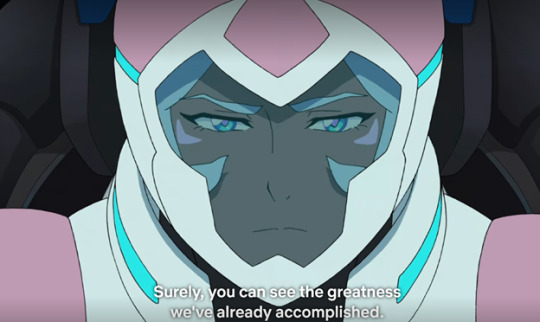
So Lotor actually reverts to the same logic of the AU Alteans—peace at any cost, just look at the results—
And keep in mind that the AU Alteans also manipulated Allura’s excitement about them, to get her to make the transreality comet usable so they could go into other realities. So Allura has felt betrayed and used before, by her own people.
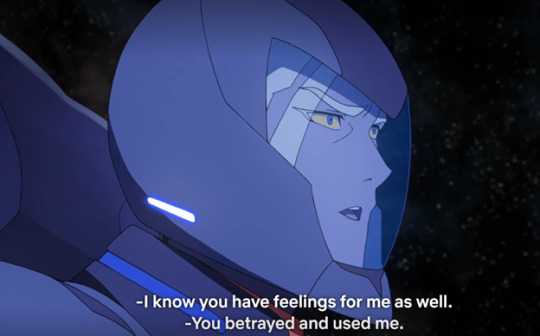
So when she says this:
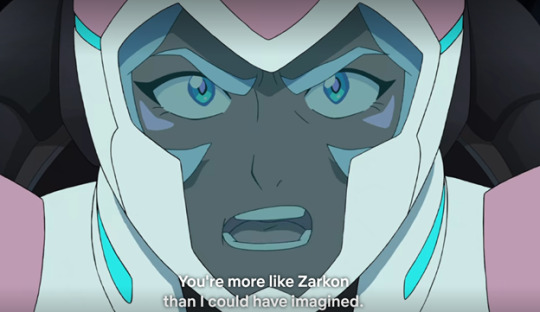
Yes, it’s a reference back to how Zarkon manipulated his friends in order to get access to the quintessence field, at the explicit cost of potentially killing his own people. But it’s not without understanding that yes, Alteans can be just as manipulative and betraying as Zarkon. Because she’s experienced it, again and again.
As a matter of fact, six out of the eight seasons of Voltron: Legendary Defender feature villainous Alteans/Alteans on the wrong side of the war, and we continuously see Allura punished again and again for wishing that Alteans still lived.
No wonder she wanted to die.
This is something that I find uncomfortable about the narrative of the show. Previous iterations of Voltron did in fact have a “blood on everyone’s hands” perspective, such as within the ages 16+ Dynamic Comics. However, Arusians/Alteans in those old Voltron narratives were not victims of genocide. VLD turns Alteans into victims of the worst racial crime possible and then also consistently portrays them as inherently antagonistic to genuine peace efforts in some way, instead of focusing on the evil of the oppressors.
And this is such a double whammy for Lotor’s characters as well, given that he was abused by his parents and threatened with slavery via his Galran culture, and that he was half-Altean too trying to connect to his lost culture.
As a matter of fact, the larger show’s narrative interest in “victims as antagonists” makes it such that when we see victims try to enact actual justice, it feels almost jarring. Let’s look at that s8 Zarkon moment you brought up as an example, where Allura destroys his innocent perspective by showing him his evil deeds.
The s8 Zarkon is a weird topic because 1) This Zarkon actually doesn’t exist outside of Honerva’s mind, so how he has any kind of actual free-will is beyond me, unless someone wants to argue that Honerva actually cursed his true soul just as she cursed the other paladins. It’s hilarious too, because Honerva-mind-Zarkon also calls Honerva a psychopath, so I guess now Honerva is psychoanalyzing herself using her dead husband as the vehicle, while also discreetly helping the paladins to stop herself—
ANYWAY, using this Zarkon as a “proof” of Allura’s “racism” is also cherry picking in the weirdest of ways. Is she angry about his horrific and incalculable crimes, including even how he betrayed the OG paladins and ruined his own planet? Absolutely. Does she want him to be aware of his crimes instead of having to pretend like nothing’s wrong? Yes.

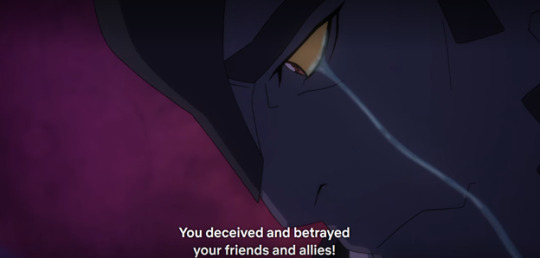
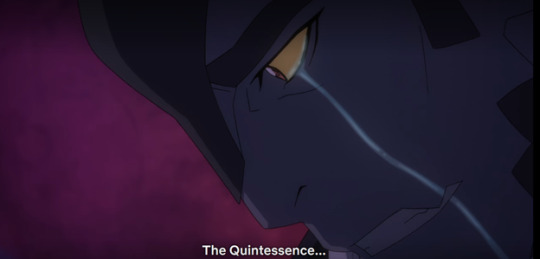
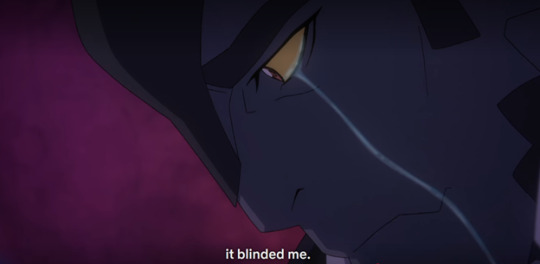
But notice here, this Zarkon actually shows remorse. He is actually crying over those memories and recognizing that he had done something wrong. And Allura can work with that. In fact, out of everyone standing around and doing nothing, it’s Allura who gives him a second chance and offers an alliance with Zarkon in order to stop a crazy Altean:
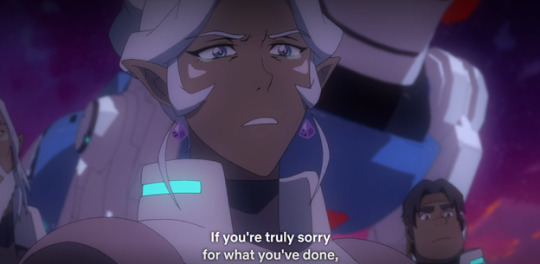
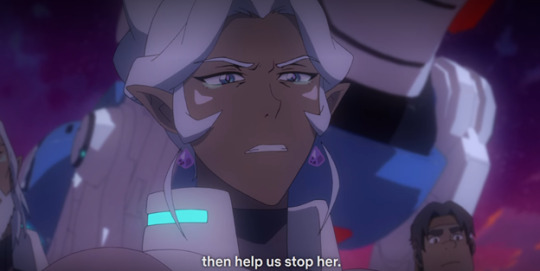
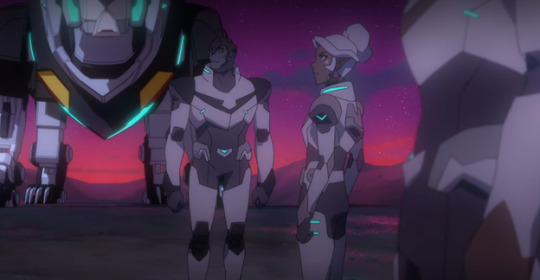
Keep in mind too, Honerva didn’t have memory loss at the end of s8. She knew exactly what she’d done and had given up and had to actually be convinced to do anything halfway constructive. That’s a very different circumstance than mind-Zarkon had, who jumped at the chance to do something to fix what all had happened, and gets even morally righteous about it, calling his own wife a psychopath, lol.
So generally, antis who believe Allura was a racial supremacist haven’t watched the show holistically. We see her hold the same standards to her own people as she expects out of others. This show would look incredibly different if Allura were a true racial supremacist.
Ah, you ask. Okay, so we’ve refuted the big pieces of “evidence” used to incriminate Allura. But what about all of those weird details about ancient Altean history? The violent language-learning program that scared Pidge? The violent terraforming tech that almost kills Voltron? The concept that Alfor tried to play “police” over the Galra and actually blew up their planet? The Alteans’ ongoing discussions of “peace and diplomacy” and spreading it throughout the universe while they happen to sit on a massive load of ancient power?
The s3 finale and other facts throughout the series very heavily smash the claim that our canon, in-universe Alteans were evil colonizers like the AU Alteans. The biggest piece of evidence to the contrary is that the Altea we know was one (1) planet. You counted right. One planet. Not an empire, but a singular planet. The s3 finale corroborates this, showing Altea as being largely isolationist from a military perspective while Daibazaal and Nalquod warred "for generations," right in front of their salad.

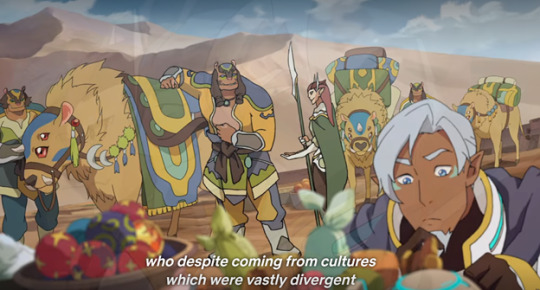


So some viewers would have you believe that Alteans were these big bad, intergalactic police state colonizers. But for all of its great power and knowledge, the singular planet of Altea didn't even canonically interfere in the wars of its own galaxy for actual millennia? And looking at the screenshots upon the stabilization of the alliance, Alfor is revealed to not have had experience with a neighboring culture. His face while exploring Gyrgan’s homeworld is an indication that it’s all rather new for him too. So again, we have evidence showing that Alteans were not colonizing or even functioning as a police state.
Note here that in the s3 flashbacks, the show confirms that it actually wasn’t just Alfor who suggested an alliance. All five leaders had common interests in protecting their galaxy from even worse threats, so all five came together at the same time. This is actually the first piece of evidence we have of Altea entering into some kind of intergalactic military agreement to stave off said worse threats.
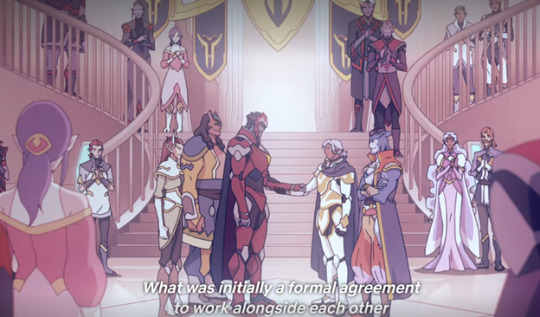

And all of this is on top of a history where in s6, the Galran Archivist confirms that the Galran Empire had existed before Zarkon for 3,000 years, with times of “expansion.” It’s very easy to see that Blaytz’s people were actively fighting off Galran occupation of their homeworld within this past.
And that’s actually what I think makes Alfor and the OG paladins some pretty interesting characters. Here, we had colonizing Galran empire setting down its sword and accepting the value and space of its neighbors. Here, we had master alchemist Alfor giving up military power within their group by acknowledging Zarkon as the superior strategist. Here, we had Blaytz who had previously been battling Galran occupation…fully accepting the Galra?

So the OG Paladin backstory represents a pretty incredible alliance that removed a lot of intergalactic toxicity and helped heal broken bonds. But it required all five leaders to agree to that. Alfor did not throw his weight or power around within this. There were several checks and balances here.
But this backstory also helps to explain some of the quirky details about Alteans. Their planet existed within an active war zone, and it’s very likely that they’d had to fight off Galran occupation just as Blaytz’s people did. So the violent robot trainers and fear-based language learning systems start to make sense. Alteans weren’t just simpering people playing harps all day and eating grapes. They were actively prepared to defend their planet and their culture.
So when Allura says in season 1 that Alteans were “spreading diplomacy” across the universe, the only pieces of evidence we have of that is the OG paladins themselves, in which Alfor was a big part in creating that alliance—and then possibly the Alteans with the Balmerans, given their deep collective rituals with that planet while the Galra literally just came in and ripped the planet nearly to death. Allura tries to mimic what it means to accept and interact with a culture without changing it well in season 1, when she stumbles through trying to respect Arusian culture and its demands on its people. Also, there is a big fact that antis like to overlook:
The fact is, despite the untold numbers of civilizations we interact with across 76 episodes, no outside race remembers Alteans as evil colonizers. If they were really so big and bad, we would have heard it, like, “Man, yeah the Galrans are bad. Just as bad as those Alteans, back in the day.” Or something. But nope, nothing.
So I heavily question the history of Altea as an ancient colonizing race. If they were, then Altea wouldn't have just been a single planet with limited resources to fight wars in even its own galaxy. All of this supports the idea of Altean children being raised to fight--because they were preparing to defend themselves when/if diplomacy fails.... But the fact that the Balmerans see Alteans fondly and that literally every other race we run into is explicitly suspicious of Galrans and not at all of Alteans says something.
I think the only piece of evidence there might be for a genuinely colonizing ancient Altea is the use of terraforming technology, as mentioned in s4. Haggar discovers it and activates it to try and kill Voltron--and she nearly succeeds, because said tech destroys the entire crust of the planet to reform it. But you have to step back for a second and wonder--if ancient Alteans were so powerful, why was Alfor struggling so hard to even hold his own planet together in the midst of all these other cultures warring and larger threats? If they had this technology--and they did know about it because Allura recognized it right away as ancient technology--why the heck wouldn't they use it? Or were they using it, and it was to reform uninhabited planets to help sustain displaced peoples? Why is it, if Alteans were so terribly bad, we have no record across ANY of the many alien races being cautious of them? Even Galran Lieutenant Lahn snapped at Allura only because he was jealous of the general security she had back on, you guessed it, explicitly Altea. There's a lot of potential explanations for a positive use of terraforming technology, and the evidence against colonization and Altea committing omnicide against other races is incredibly more aligned with the other details in the canon.
And even Alfor’s creation of Voltron and the blowing up of Daibazaal—that’s something that antis like to position as evidence of his police-state ways to underhandedly control other cultures.
So let’s tackle those too while we’re at it.
Honestly, I know people like to hate on Alfor, and I do think his character picks up some misogynism just from the writers....But I don't think he was as much of a controller as people think he was. He was already in an alliance with four other leaders to try and stop bad things from happening in their galaxy. That meant they were expending incredible amounts of time and resources to accomplish that end—resources that were not renewable and may have been straining various planets. We know that he started building Voltron with Zarkon and everyone else's blessing because he called them "clean ships," but it's only after the rift creatures attack that suddenly Alfor's perception of Voltron moves from "clean energy" to "omg we need a more powerful weapon against this unknown enemy.”
So these are his intentions BEFORE he discovers rift creatures are a threat to the universe. While Zarkon states that these new ships are to be endlessly powerful for the Galra Empire, Alfor shames him by offering what his desire is for them:
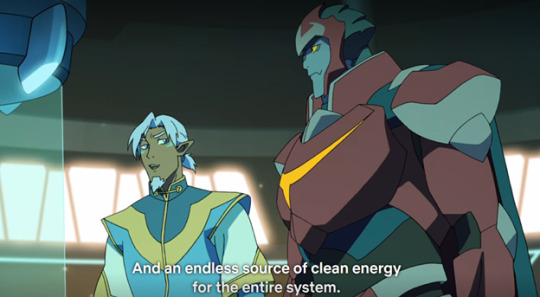
After the rift creatures nearly destroy Daibazaal, intentions change.

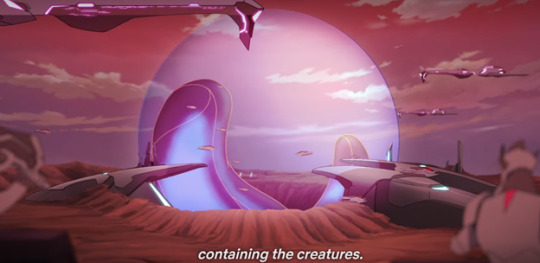
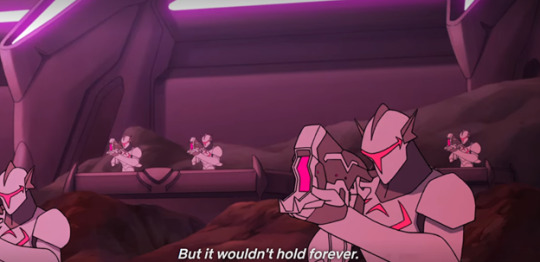
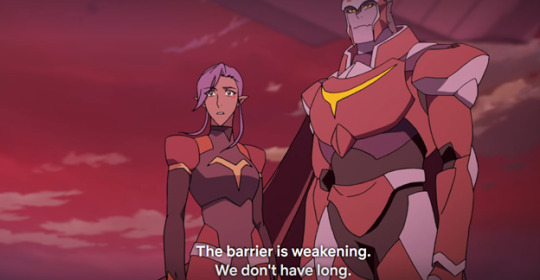

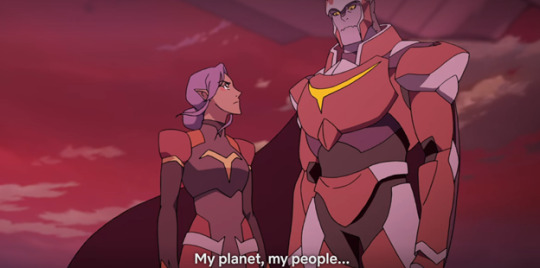

So here, we see the game change in a BIG way. Voltron is not just about offering a more renewable way of sustaining peace-keeping efforts. Alfor is now adjusting and finishing these ships with the explicit knowledge that if they are not powerful enough, then Daibazaal and the Galran people will die. Alfor’s got a LOT of pressure on him now to deliver a mighty and powerful weapon to stop this new threat. So even his creation of Voltron as a superweapon involved using it to protect people from imminent death—not to police them.
And about Alfor blowing up Daibazaal—once again, it’s Alfor trying to clean up Honerva and Zarkon’s mess. Honerva had convinced Zarkon that the rift needed to be wider, and so Zarkon deceived the paladins into widening it.
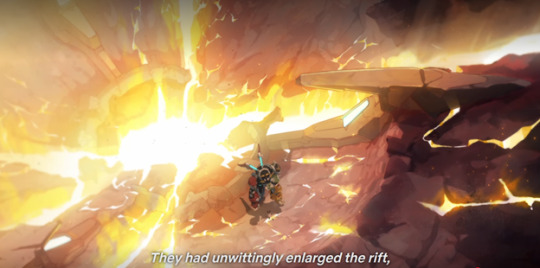

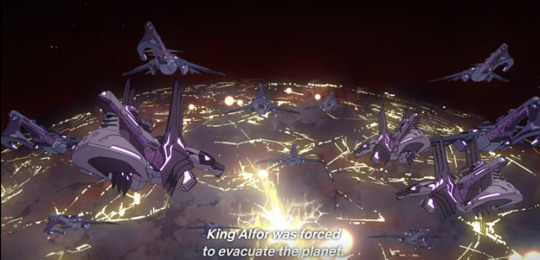
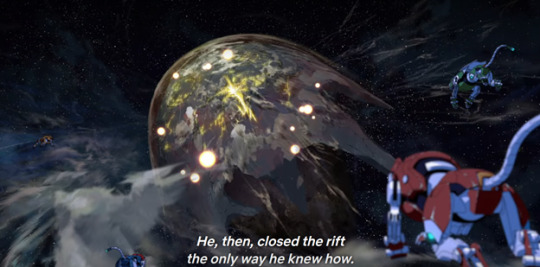

So keep in mind here, at this point in time—the rift was destabilizing and eating an entire planet. The entire universe was now at stake. Alfor had to choose between a bad fix and an even worse option of allowing everyone to die, but he very clearly evacuated people before destroying Daibazaal, as part of his promise to keep Galrans safe. So that no one would have to die.
And as a matter of fact—about that terraforming technology. How sure are you that Alfor didn’t intend to use it to build Galrans a new home? It’s entirely within the realm of acceptable conjecture that he allowed for the existence of that technology because it could restore what had been lost.
And here’s where the story gets really screwy and feeds into some anti hate. Because when Zarkon wakes up as a zombie, he desires more quintessence as zombies do.
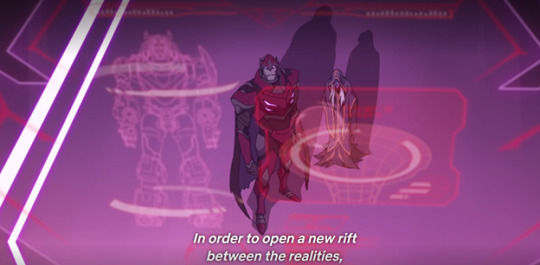

So he’s pissed that Alfor just cut off his gateway, and he manipulates his people:


And it’s here where we get the idea that Alfor was an evil controller. The idea came from Zarkon, who—we can look around pretty easily and see that he was not a man of honor, ultimately. Even if you chose to not believe the s3 finale flashbacks as being objective, there’s something wrong with Zarkon. (It’s clear that the show thought using Coran was a smart way to shell off massive amounts of info, because clearly if this were truly in Coran’s perspective, we would NOT have had intimate looks into Zarkon and Honerva’s bedroom as Zarkon is tending to her, like omg.) Numerous sources, histories, and cultures outside of Coran confirm that Zarkon hit a point of no return on the evil scale, and that he projected his own blame for Daibazaal’s destabilization onto Alfor in order to raise up his new regime in the name of Quintessence™.
So at the end of the day, even Alfor was a victim. But yet somehow, various antis choose to believe Zarkon’s victim-punishing narrative because said antis can’t or else refuse to connect one scene to another since it undermines their justifications for why they can hate on Allura. And that’s not so much an issue with the story itself as it is just poor critical analysis or malicious weaponization of content against other fans.
Now, at this point, we’ve talked about Allura and we’ve talked about Altean history. I have numerous other posts about Allura’s interactions with other races and Galrans and overcoming trauma to give the entire universe a second chance. So if there is anything in this show that suggests Alteans were in any way a superior race, then it’s probably within the show’s own worldbuilding. The show contradicts its own definitions of what quintessence even is by suggesting Alteans have “bluer/purer quintessence” in order to justify why Lotor would even be trying to sacrifice them for anything. The show-championed concept that Alteans have a bluer, purer life force above all other people, and that only Altean energy could interface with the fabric of space-time. Now, this is a problem in the later seasons’ world building itself. And you know who wrote that in? The production team. So once again, we do have racial issues in this show, in ways that shows like Star Wars desperately try avoid by showing racial diversity in who has Midi-chlorians.
That said, I’m not a perfectly woke storyteller either. I think every story and show is going to have something problematic™, but with VLD it’s very clear that its disrespectful handling of genocide politics and shatterglass conspiracy theories, on top of its weird master race angle created the perfect storm. These mishandled and quirky details have created a cognitive dissonance with the provided narrative, resulting in some people in the anti fandoms to champion what aligns very closely to actual neo-Nazi propaganda against Jews, who according to them are not victims but instead the true perpetrators of all bad things. For the sake of the antis, I’m pretty sure they’re not intentionally looking at VLD this way and are probably just looking for any easily graspable reason to hate on Allura for interfering with their ship or something.
But this kind of subliminal propaganda that undermines victims, and the effect it has had on fandom morality politics, is deeply concerning to me. I really wish that we’d had an opportunity to respectfully and critically discuss this with the production team of the show, because a Y7-FV show about “strength in unity” should NOT result in us needing to have a conversation about people walking away with neo-Nazi-ish propaganda sentiments against genocide survivors. Like. Clearly, VLD is fictional, but it’s feeding into a real-life beast that it does NOT need to feed. And it’s keeping alive ongoing conspiracy narratives against some of our most vulnerable populations on the planet.
So, we need better stories. We need a production team that, if they’re going to get paid to do something involving portrayals of genocide and politics, that they need to do their research on those topics. Nobody is going to be perfect with a creation, but VLD validated some very damaging things—and it ALL is something that could have been fixable. I think it would have been incredibly validating to hear the production talk about and accept that these were issues that cropped up unintentionally, and to hear them confirm that these issues are not the sorts of things that VLD was supposed to champion.
The greatest tragedy of all of this is the potential that this show had to really champion some great and validating messages, and the potential that we as a fandom had to come together and do something that fandom was meant to do—which was celebrate the things we love. Because that’s why we’re all here. That’s why this crazy tumblr of mine even exists. It was supposed to celebrate things.
For that reason, I’m going to end this here. I’ve written several responses now as to my thoughts on the inappropriate narrative lens of the show, its contradictory and damaging worldbuilding about the purest race, and how it champions demonizing or punishing genocide survivors again and again. Within all of that, I’ve talked at length about Allura’s character and behavior over 8 seasons and how she built even empathetic connections with militant Galrans like Commander Lahn. In fact even her own homesickness is how she emotionally connects with Lahn, because she understands that desire to call something one’s own. To have a home. A family.
I now really would like to get back to writing stories that I find meaningful to me using these characters and these worlds—and trying to find the hope in all of this darkness, haha. And maybe with any luck, I can hope to do VLD some justice, knowing that I am still on a learning journey as well.
But I appreciate your note, and I hope this very extensive response helps to settle your questions and concerns once and for all regarding VLD Allura. If you should have any remaining questions, please feel free to reach out via a private message to discuss. Thank you!
#Volron#VLD#Allura#VLD Critical#Alfor#Zarkon#Honerva#Lotor#I hope this helps explain my perspective#I think this might have to be my last refutation to the Allura as racist/racist supremacist conspiracy theory#at a certain point#people either watch the show holistically or they don't#you can't convince an anti#so this meta will probably not help an anti#but if you're sitting on the fence and felt drawn in by anti propaganda#then I hope that maybe this post provides an alternate perspective#and one that tries to be more holistically fair to all 8 seasons of the show#and to the intentions and general oversights that can occur during production#Ultimately it doesn't matter if someone likes or dislikes Allura as a fictional character#we need better entertainment that can handle these hard topics and handle them well#And we also need a fandom who's willing to look at all of the information and not weaponize it to specifically demonize and silence others#Maybe a family TV show shouldn't be appropriating conspiracy theories from the Protocols of the Elders of Zion#real-world fans are incredibly vulnerable to such conspiracy theories#and it creates a lot of real-world strife as a result
19 notes
·
View notes
Note
Can you rank your fave CoD antagonists?
Hello there nonny, sorry for taking so long to reply and thank you for your ask ♥♥
Rank my favorite CoD antagonists? Sure, I can do that! There are several antagonists in the series, but I’ll only rank my top 3. Hope that is okay with you c:
3. Jonathan Irons
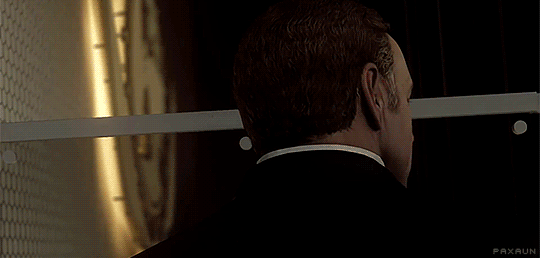
Original gif
Advanced Warfare may not be a series as popular as BO or MW, but I actually enjoyed the game and I also liked Irons. Honestly, I don’t think we’ve gotten that many antagonists that started out as our allies in CoD (at least I don’t remember any others atm), much any less an American antagonist, so that kinda made him stand out to me.
I’m not familiar with Kevin Spacey’s works, and I barely watched any trailers pre-release. So to see Irons go from someone who I believed genuinely wanted to make the world a better place, where every human being could live in peace and thrive, away from the pointless wars that governments waged, to someone who was willing to use any means necessary to achieve his goals, regardless of how many lives he had to sacrifice... well, that was something that hit me hard.
This man who gave my character a second chance, who treated me (Mitchell) as his son, who cleaned up after the colossal mess that others countries made, helped people from devastated war-zones rebuild their lives and gave them hope for the future, turned out to be someone I was forced to betray because of different viewpoints and philosophies. Despite everything, I think Irons had his heart in the right place, but his methods were ultimately terrible and in his messianic delusions he ended up doing more harm than good, so of course he had to be stopped.
And what I liked about him was that he didn’t start out as a bad man, he didn’t do all those things because of greed, and his characterization wasn’t that of a cartoonish villain. In a way I could find logic in his arguments, he made a few good points about the current state of the world and the inability (or indifference) of many politicians to solve the real problems of the people. But the root of it all lies in the loss of his son, his only child, to a government he no longer trusted nor had any faith in doing what was right. Despite having served in the military in his youth, Irons had grown disillusioned at the way the US handled domestic and international policy, and strongly disagreed with them— opposing the status quo in favor of change.
One could argue that serving in the military was entirely Will’s choice all along, and as a grown adult he knew what he was getting himself into. Still Irons couldn’t help but think that if that war had never happened, Will would still be alive. So that left him with a bitter taste, and it served as the catalyst behind his actions.
If nobody else would bother to do anything to actually solve the world’s problems, then he would be the savior to do it— whether they liked it or not. And he didn’t care what methods he had to use, how many had to die, or if he had to plunge the world into total chaos before he could ultimately end all wars and bring everlasting “peace” (perhaps one of the greatest ironies) as his dream seemed to be. Even at the cost of such a high price.
I don’t think Irons gets the credit he deserves.
2. Raúl Menéndez
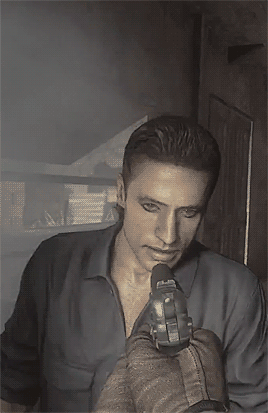
Original gifset
BO2 is one of my favorite games and Raúl is undoubtedly one of the most memorable antagonists in the series. Much like Irons, his actions were heavily motivated by the loss of a loved one but his life is also one sad story, so it’s no wonder he turned out the way he did. Not to justify him, but it’s not hard to understand what led him to do all those things.
From a very young age, his life was destroyed by the actions of Americans, from the horrors of the dictatorship in Nicaragua (in which the Contras were supported by the US); the crippling and disfigurement of his young sister Josefina, due to the greed of an American owner who burned down a warehouse in order to obtain 11,000$ through insurance fraud. After losing everything during an earthquake, and becoming homeless, Raúl and his father started over by selling drugs, successfully establishing a cartel that was so powerful in Nicaragua that they were equally feared and admired among the people.
But this status and power they had newly acquired concerned the US government, and it wasn't long before they sanctioned an assassination order on Raúl's father and sent the CIA in to kill him. Raúl observed it all, a teenager back then, and managed to escape thanks to his father's training. Though he could do nothing to stop it, nothing to save his father, this event marked him and further embittered him against the US and the West. And the last straw was the unfortunate death of Josefina, at the hands of Woods. He lost his sister, the only living relative he had, and his world fell apart. But if we think about it, Raúl was indirectly responsible for her death too, after the horrible torture he put Woods through in Angola. So the next time Woods saw Raúl he lost his mind and threw the grenade that tragically bounced into Josefina's bedroom and killed her.
So he spent all his life orchestrating a huge plan, a brilliant plan, that would shake the US from the very ground. And he was damn charismatic while executing it, earning the support and approval of billions of people all around the world— even from those who lived in US soil!— to begin a world revolution and end the dominance of capitalist nations that had subjugated other weaker countries, amassing huge riches through market economy and wars for resources, destroying lives and sinking many in poverty. And he also manipulates and pits two superpowers against each other... sending everyone to the brink of another world war, or a second cold war at best.
He wanted revenge on the US for playing with the lives of other people, for taking everything he loved away from him, by making them live in fear and destroying everything they had built. He wanted them to feel the same pain, to suffer the way he did. And he wouldn't rest until he achieved that because he had nothing to lose anymore.
Depending on the outcome, he can get revenge on Woods for Josefina, as well. And though we all like it when the "good" guys prevail and foil the plans of the villain, I think this particular ending had a much deeper and stronger emotional impact. The conversation they have at the end is something I didn't expect. Raúl has come to kill Woods but they're both in a place where the years have beaten them down with the weight of they’ve done and rather than an over the top scene, what we’re given is quite the opposite of that.
There’s no screaming, no heated argument between them, no dramatic lines. It’s just two old men who had to live with what they’ve done, and who have come to terms with the inevitability of that moment. Raúl slits Woods’s artery with Josefina’s pendant, and then he does something that surprised me: he closes Frank’s eyes, takes him off the wheelchair and lies his body on the bed. Something that is a huge contrast with what he did to Hudson many years ago... the savagery he used when killing him. For Raúl to behave that way with Woods, the man he considered to be his sister’s killer, it raises the question as to whether he still hated Woods after all these years, or maybe deep down he finally acknowledges that his actions (namely torturing Woods and killing his whole team) was the true motive that led to Josefina’s death.
The thing is, Raúl knows that he's to blame for what happened. It's also the reason why he burns himself alive in front of Josefina's grave. It’s because he has to pay for what he's done to her, too, and he chose to do it in probably the most horrible way possible but it didn’t matter to him. Nothing was more painful than living with the knowledge that his sister died because of what he did.
To him Josefina was the true innocent soul, who didn't deserve any of the suffering she went through.
1. Vladimir Makarov
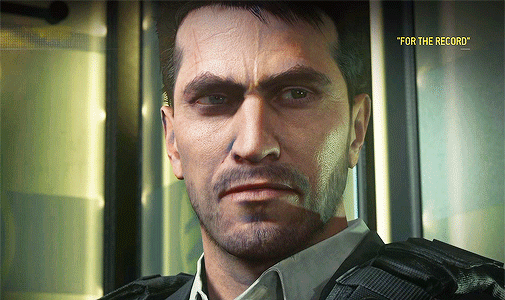
Original gifset
It’s no secret that Vladimir is my most favorite antagonist (and character) in all of Call of Duty.
Though his background and motives weren’t as well developed and explained as those of other antagonists in the series, his untold story (which you won’t find anywhere in the game, though you can deduce if you have a basic idea of the situation before and after the fall of the Soviet Union) perhaps says a lot more about him than one might expect.
There’s not a lot we know about his past other than the meager information that was provided in some loading cutscenes, but it’s reasonable to think that Vladimir wasn’t always the trashbag that we see in the games. He once was a young man with dreams of patriotism, who wanted the best for his country, who loved Russia with his soul, and who would do anything to protect her, because as a soldier that was what he was taught to do. As a soldier, that was his purpose in life and without that reason to drive him on, he had nothing left.
And however vague his backstory may seem to be, it gives you an idea that Vladimir in a way was a victim of a system that imparted a type of soft indoctrination on him, from a very young age (as many states do all around the world in some form or another, even those who hold democratic values), all the way to his education in the military academy and his brutal training in the special forces, that further cemented this undying love for Russia, maybe in a way that bordered brainwashing.
His true radicalization came after the fall of the Soviet Union with the loss of his homeland and the Soviet culture as he knew it, as well as Russia becoming weak and losing much of her power and influence across the world. Then came his deployment in Chechnya in 1994, where he lived the horrors of a war that most likely left him psychologically scarred after the experiences he had to go through. And when he returned home, he was kicked out of the armed forces under accusations of human rights violations during the First Chechen War. And they may be true, he probably did a lot of bad things there (under the illusion that he was serving his country for a higher cause), and sadly it’s something commonplace in many armed conflicts. I’m going to leave this short post here for some details on that.
When he returned from war, he didn’t receive any professional help or if he did, it didn’t work. He didn’t know how to cope, he ultimately was unable to adapt to a normal life, he became a misfit. He had lost his job, he had a stain in his career, and finding a decent way to get by was very difficult at the time when the country was in the middle of a political, social, and economic crisis.
He was in financial ruin, and it was hunger that pushed him to become a criminal (something that wasn’t uncommon for ex military men in 90s Russia). Not just that but also hatred for those in power as well as society as a whole, and what they represented: total decadence and the reason why Russia was falling apart with these “stupid” western conceptions about freedom that in his eyes did nothing but give leeway for debauchery and corruption, which he ultimately sought to “fix” by returning Russia to what it used to be (a god-fearing empire under the autocratic rule of a tsar that was likened to a father to all his subjects, and where religion was used as a resource to legitimize his power and as a moral regulator that maintained the social order).
He pretty much felt abandoned, betrayed by his government— a leadership that had done nothing but sink Russia deeper and deeper into ruin, destroying the values under which he was raised and turning people like him into cynical masses that had lost faith in everything and were adrift without any real purpose in life, no future to look forward to, completely disillusioned that the dreams they’d bought into, the promises they had been sold by the west, were nothing but lies.
He’s still a piece of garbage, we know that, but I also think that he’s gone through a lot of struggles and bad experiences in his youth that marked him and filled him with resentment. Everyone sees Vladimir as the puppet master of the storyline of MW, and we have to give him credit for that, but deep down he’s just a man who has been a slave to his own obsessions and ambitions, unable to free himself from the hatred that has poisoned his mind for years, which led him to commit so many atrocities and strip himself from any semblance of humanity— all for the sake of a higher cause, as he undoubtedly tried to justify his actions at the end of the day.
In conclusion, all three were marked by losses in one way or another, and saw themselves as men who had to take the hard path and do what had to be done. And it’s also curious that Call of Duty, while not a game with any deep meaning on the surface, almost seems like social commentary on how war ruins lives and how anyone can do horrible things if put through the wringer enough times. It’s like these stories are trying to say that bad circumstances can make bad men out of seemingly good people, who wouldn’t have done any of the evil they did if maybe things had been different.
And I think that’s what makes these characters so interesting.
#vladimir makarov#raul menendez#jonathan irons#call of duty#modern warfare#black ops#advanced warfare#i'm really sorry again#it took me a while to write this one!#but it's done at long last c:
42 notes
·
View notes
Text
JUSTICE FOR JESUS — Misconceptions & Prejudices about the Faith in the Biblical Jesus Christ.
PART ONE: Christianity is not a Religion, it is God‘s plan to redeem mankind and have a relationship with us forever
I‘ve used to think that Jesus is about Religion, Church, Pastors, Dogma. When you look around in the world it makes sense: Everyone believes something different, all faiths are entirely valid for the people who practice them. Of course you throw Christianity in the same pot as Islam and Judaism, they‘re called „the Abrahamic Religions“ (because Abraham was the father of Isaac, who was the father of Jacob, and Jacob is „Israel“, but also Abraham was the father of Ishmael who was only born because Abraham and Sara didn‘t put their faith in God to have a child like God promised, they were impatient and didn‘t have faith, because Sara was already old and could actually not get pregnant anymore, so Sara suggested that Abraham should have a child with Hagar, the handmaiden of Sara; and from Ishmael‘s lineage basically the Arabs and Islam came along, since God had promised to make a great nation out of Abraham, this blessing went worth to both sons of Abraham) - so basically YES, Jews and Christians worship the same God. The God of Abraham, Isaac and Jacob, as it is written all over the Old and New Testament. The only difference is that Christianity has been infiltrated by Satan a loooong time ago, and Judaism (for the most part) rejects Jesus as their Messiah, even though Jesus was prophesied from the FIRST LETTER of the FIRST WORD of the FIRST BOOK of the Bible/Torah FOR the Jews! When he finally arrived FOR the Jews, the Gospel (the message of Salvation) was preached to ONLY Jews for 7 years (3 and a half years of Jesus‘ ministry, 3 and a half years after His death preached by His Apostles) and only THEN (after the Jews for the most part rejected the Gospel and persecuted everyone who believed in Jesus; our best example for this is the Apostle Paul who was actually Sha‘ul; he was formerly an extremely Jewish Pharisee who relentlessly persecuted Christians but then Jesus Himself appeared in a vision to Him and asked Him „Why are you persecuting me?“ and by seeing Jesus‘ glory and majesty, He was born-again and wrote ~70% of the New Testament) God decided to spread the message of Salvation to Greeks/Gentiles as well, because He wants to save all humans, and His chosen people would not do the work that He hoped they would. God‘s priority was always Israel until they have entirely rejected the Salvation that is ONLY found in God‘s Son, the Messiah, the Anointed One: Jesus Christ. Gladly there are a lot of messianic Jews nowadays who do their best to bring Israel‘s saviour to the Jewish people, just like it was supposed to be.
Every single Religion or Faith that there is that does not teach that you can find Salvation in Jesus Christ, the literal Son of God, will not give you peace, love and the Truth, will not give you Eternal Life (and if „Heaven“ and „Eternal Life“ sounds too ethereal for you try „different non-linear dimension“ and „consciousness transferred into a spiritual body“ - because THAT‘S how it was supposed to be before our Earth fell into a linear timeline, away from God‘s presence) and that‘s just how it is. There are tons of Religions, Faiths, even pretty much ALL Christian denominations and all the Christian cults, each one of them has a different way of denying the only thing that leads to Salvation: Jesus is the LITERAL only-begotten Son of the one true God & He died for our sins & was raised to life again by God the Father. Satan literally tries in ANY way possible to deny the LITERAL Sonship of Christ whose Father is God Almighty, YHWH. [...by the way, if you believe in that Zecharia Sitchin nonsense, please visit http://sitchiniswrong.com/ - by an ACTUAL scholar of Biblical Hebrew and of Ancient Semitic Languages]. And for the people who don‘t even bother with Jesus at all, he developed a plethora of options, to believe in something else, his first and only goal is to keep people away from Jesus, and he literally does not care how he accomplishes it. Every single Faith that does not lead to Jesus and into the Kingdom of God, has its roots in Ancient Babylon and leads into the Kingdom of Darkness. There are literally only two options, and that’s the absolute Truth, no matter if “truth” today is a “subjective matter for everyone”; that’s exactly what Satan wanted to achieve, and he sure did it. People are always extremely offended when Christians claim to have the only true God, the One who brought all things into existence despite the circumstance that they don‘t even believe in the FACT that we were brought into existence by this one God through Jesus Christ (who is the „Word of God“, and as you all know „God said: Let there be light, and there was Light“ - basically God spoke things into existence BY his Word, and his word IS Jesus Christ, the Son of God).
People rather believe in an extremely ridiculous and propagated concept of a „Big Bang“ that caused things to just „happen over time“, that our Earth is millions or billions of years old, that it is sheer „luck“ that we can survive because if we were just a tiny bit closer or less close to the Sun we would either burn up or freeze, that we evolved from ape-like men who were not very intelligible, that our extreme complex languages also probably evolved from ape-like sounds (you have no idea how ridiculous all of this sounds, when you are awake, I can‘t even type it without putting it in „quotation marks“, and you literally can NOT UNSEE the Devil’s work once your eyes have been opened) when there is literally an abundance of undeniable evidence that the Creation by an intelligent and brilliant God is a LOT more plausible; or let‘s say: there is a LOT of evidence that the public narrative is simply a deception (for example, tons of GIANT human bones have been found since at least the 1800s but of course not a single person informs us about stuff like this, and of course we don‘t make an effort to research it, because we‘re all brainwashed until we realize the Truth; people who study their Bible know EXACTLY who these giants were and they also know exactly who all those other spiritual entities are which we see in Mythology from ancient cultures) - and when the public narrative is a deception, the only logical conclusion is that something different must be true. And which book contains the entire story from the very Beginning to the very End of humankind, which fulfilled a massive amount of prophecy throughout human history 100% accurate, and is by „sheer conincidence“ the most translated and printed book of ALL time? Exactly! The Bible!
„In the beginning (TIME) God created the heavens (SPACE) and the earth (MATTER)“ — Genesis 1:1
(parantheses added)
Isn‘t it AMAZING how the inspired Word of God through the Prophets conveys complex scientific concepts in only a little sentence? THAT‘S how incredible God is! He is a Mastermind and good beyond ANYTHING. Sadly Satan has accomplished that the world sees our Creator like a hateful, narrow-minded, strict and arrogant Ruler who just wants to dominate us and put His Religion on us, but that could not be further away from the Truth. God, in fact, HATES Religion, all He ever wanted is to be loved by His people, acknowledged by His people and praised by His people (and honestly, He DESERVES praise for Everything He has done for us and for Everything that He is!) .. And then of course, you can look all around in nature! I swear, being born-again is like being a child again, before this world and our „education“ brainwashes you. When I walk outside, I just MARVEL at God‘s handiwork, it‘s literally AMAZING. When I look at flowers, veggies, fruits, animals, insects of all kinds (I even lost my fear of spiders and wasps and even hornets, it‘s just amazing to look at them), when I taste different kind of nuts, herbs and spices (by the way, isn‘t it amazing how there‘s a herb or plant for every health issue a human can have, just like the Bible says? if we really evolved from a Big Bang to THIS, how do we explain the miraculous powers of all of these things? Have they just „happened“...?) look at the funny shapes of everything; everything just blows my mind, it‘s incredible. Someday I really want to ask God what He thought when He created Romanesco Broccoli because each time I see that thing, I just marvel at its weirdness and beauty. The world is just so ridiculously beautiful and NO ONE can see it except born-again Christians (I‘m really excited for eternal Life because this Creation is in a fallen state and the Bible says that the actual glory of the actual Creation is even more magnificent, WHOA...!!!) and I sometimes literally cry because it‘s SO SAD what Satan has made us believe about our planet, about ourselves, about literally everything. And why? Just because he hates Jesus, he hates God and he most certainly hates EVERYONE else, you, me, everyone. He loves only himself and he doesn‘t care if he‘s robbing us from the most astonishing experience ever: Life! He enslaves us through spiritual warfare to desires that we would naturally not have (social status, money, power, career, material objects of all sorts, fame, success, other people no matter how toxic they are for our health, drugs, likings and addictions of all kinds, literally ANYTHING can be the work of spiritual warfare) and makes us believe on top of that that we‘re just a bunch of random Apes in a random world, that our purpose is to make money and survive in a society that grows more and more into cold robots each year, only so that at the end, we die, never knew Jesus, and perish in Hell with him. It‘s literally the saddest thing EVER.
So yes, „Religious Freedom“ is a thing; everyone CAN believe whatever they want and feel drawn to, but ONLY born-again believers in Jesus Christ will live with God forever and ever in a different dimension that is not bound to time. Just like God wanted to live with us from the very beginning! We are His masterpiece of creation! Did you know that we are more cherished than angels? He sent his LITERAL SON to die for us, ALL of us, just so that we can live with God! Isn‘t that incredible??? I’m just absolutely in Love with God and Jesus and I’ve never thought that I’d EVER say this, growing up as an Atheist and then, over 2 years deceived in a spiritual bubble that is not even real.
My prayer is that the people who are written in the book of Life and belong to God’s kingdom find Jesus Christ, and experience His Love, because once you have, there is not a single day that is sad or empty, not a single day that seems pointless, you will have peace and a blessed hope for eternity to come. Amen.
TESTIMONIES
From Buddha to Christ. Powerful Testimony.
Chinese Triad Gangster Finds Jesus In Death Encounters
SATANISM, WITCHCRAFT, DRUGZ, DEPRESSION this is my testimony
"New Age" Occult Practices Nearly Ruined My Life | Warning & Testimony
Raves, drugs, vanity, new age to Jesus Christ | My Testimony
11 notes
·
View notes
Text
Single Mothers Will Probably Cry During Every Episode Of Queen’s Gambit - Episode 5
Beth has been listening to all of her mother’s advice. Episode after episode. She just needs a lot of time to process it, and she doesn’t need it all at once. But when she needs it, shes uses it.
In Episode 4, Middle Game, Alice was completely absent and Beth was completely lost. She listened to Alma’s advice, which was downright bad (your emotions are your strength) and she lost against Borgov. She also lost Alma and started flirting with substance abuse.
The lesson from Episode 4 was “Don’t block me out”, and I finished my essay with a note about how it’s important for young women to identify with their mothers in order to become balanced individuals, with an “integrated personality”.
Beth learned in Episode 4 that she needs to identify with her mother, even if this is scary. She also understands that the world might be telling her that her mother is a freak. But at the same time, the world is telling her that Alma was in the right. Drinking heavily, the way Alma was doing it, is completely accepted in society (Alma drank on airplanes, at the hotel and in restaurants). But Alma died, which seems to have left a mark on Beth.
If the world was wrong about Alma, than the world is also probably wrong about Alice.
And so for the first time since the series has started, we hear Alice speak, we hear her say something else than “Close her eyes”.
Lesson 5 : The Strongest Person is the person who isn’t scared of being alone.
I’ll go ahead and quote the entire sequence, because it’s just that beautiful and meaningful to me:
“Dark’s nothing to be afraid of. In fact, I’d go as far as saying as there’s nothing to be afraid of. Anywhere. The Strongest Person is the person who isn’t scared of being alone. It’s other people you got to worry about. Other people. They’ll tell you what to do... how to feel. Before you know it... you’re pouring your life out in search of something other people told you to go look for. Someday you’re going to be all alone so you need to figure out how to take care of yourself.”
The episode starts with Beth coming home to Kentucky after she’s lost Alma in Mexico. Beltik calls her and offers her to train her. He aknowledges that she is q far better player than he ever will, however, he thinks he might have something to contribute in order to prepare her for the next championship where she needs to win against Benny.
Half of the episode shows us this growing intimacy between Beth and Beltik. He shares his books with her, cooks for her, waits for her on the porch as she comes back from grocery shopping. She even goes as far as inviting him to live with her for a while.
When he kisses her, she even encourages him. But once they’ve had sex, she rolls over, lights a cigarette and starts reading a magazine. This is bizarre behavior coming from a woman. We, viewers aren’t used to this. We usually expect the woman to want to talk, giggle and make plans for the future. But Beth is emotionally detached from the situation. An ice queen. Where did she leard this. What model is she using?
Of course - she is using Alice’s advice.
The thing with single mothers that i think most people don’t understand, is that they aren’t looking for a new husband to adopt their kids and play house with them. They are single mothers. They want to be single and at the same time they are taking care of their children. Showing up for their descendants. Single Mother isn’t a stop before regaining the town of Married Mom. It is where the train stops and these women get off. They aren’t trying to remove themselves from that situation.
This is mostly why society hates single mothers and tries it’s best to discourage them.
It makes married women extremely uncomfortable. The reason is makes them uncomfortable is married women deal with a lot of abuse in their own homes. And they stay in these situations of abuse because they don’t always know how to exit them. Most of the time they don’t have the financial ressources to exit these environments. They stay in unfulfilling marriages because they believe that single motherhood is the only thing worse than that. This is why when they meet single mothers, they tend to encourage them to find themselves a new partner. It’s painful for them to imagine that there is another way.
Men dislke single mothers because they perceive cingle mother to be defiant. They believe single mothers hate men, or actively campaign against them. They find it important to let single mothers know that they are good men. That they are good fathers and good husbands. If they cannot convince the single mothers of this, they might change their tone and become agressive, and accuse the single mother of being bitter or resentful.
In general, the message we send single mothers the message that it’s just oo hard, and that they can’t raise children by themselves. And to make sure their message gets across they represent single mothers in pop culture as failures.
Single mothers might be poor and they might be tired, but at least they don’t have a man in their home terrifying them, harassing them, destroying their personalities, bringing down their self esteem, being manipulative and dominant every chance they get.
Single mothers are women who once believed in having children with a man, and realized at some point that if they stayed in that situation they would quite literally lose their minds. Think I’m exagerating? Look at Alma.
The episode is called Fork, and in chess it:
“is a tactic whereby a single piece makes two or more direct attacks simultaneously. Most commonly two pieces are threatened, which is also sometimes called a double attack . The attacker usually aims to gain material by capturing one of the opponent's pieces.”
In the first half of the Episode, Beltik is obviously the attacker. He is the one who calls Beth on the phone and shows up at her house to play chess. The name of the episode tells us he wants to attack two of her pieces simultaneously. The purpose of the fork is for the attacker to take at least one of the pieces they attack. The defendent can only save one.
I would argue that Beltik launched an attack on Beth’s mind and her body. Beth never surrendered her mind, instead she gave him sex and moved on. Thus, Beth is maintaining her intellectual independance, her inner peace & her most prized possession: her clarity.
If Beth had given him her mind, and kept her body, say saved it for mariage, for might’ve lost her drive, and never made it to Moscow, which we know is the ultimate destination for this brilliant young mind.
After a couple of weeks, Beltik understands that he won’t get Beth to settle down with him, and that all she cares about is Chess. She would probably refuse if he asked her to marry him. He leaves, and as he exits the home he lets her know that he’s figured out her addiction to the tranquilizers. That’s a very dominant move, but Beth is so strong that she doesn’t even bat an eye.
Instead, we see her sleeping in the master bedroom, smoking in bed and listening to cassettes in Russian as she studies Borgov’s personality. She is lazer focused on what her goals are and gives herself the means to achieve them.
The second part of the episode takes place at the Ohio State University where the 1967 U.S. Championship is held. Benny and Beth exchange some snide remarks as they gaze onto their competitors. They both know they are by far the best players and they will probably compete against each other at the final. In Vegas, they were co-champions. If she wins, she goes to Europe. But can she get past him? Can she beat him?
She certainly seems like she wants to. She asks him why he carries that silly knife around, or when she finds him lecturing a college student about Chess she asks “found yourself a reporter did you?”.
Benny wants her to meet him at the Student Union to have a couple of beers. At first she says no, but later she allows herself to be talked into it. They play speed chess and he wins. Over and over again.
The next day, he finds her on campus and says “It’s gonna be you or me”. She responds “Are you trying to psych me out?”
She ends up winning the game in 30 moves. Just like she gave Beltik sex, in exchange for her freedom, she gave Benny that glorious night at the student union, where all of the boys watched as he won speed chess. She sacrified that for the title - which gets her to Paris, than Moscow, where she belongs.
Alice’s advice was never to fear being alone. There’s a lot of strategies people use to avoid being alone. Shacking up with someone they had sex with once, which Beth could’ve done with Beltik is a way. Being worried about what the college students from Ohio think about your speed chess is another way.
The last scene before playing the match we see Beth gazing at the college students engaging in small talk, as they sit on the grass ouside of the buildings. She sits on the bench, at ease with herself. She doesn’t need anyone by her side to feel okay. That is her strength; that is what gets her past Benny and Beltik and across the Atlantic ocean to Paris.
5 notes
·
View notes
Text
Maybe a reason why Sega/ST is afraid of Amy having a Super Form is because it would be the most powerful of them all. XD
Yeah, that might sound like fanboy wanking at face value, but there is a reason for me to think this way in such a hypothetical scenario.
Amy is a character who despite being average when compared to some of her friends, still happens to have omething that none of them have: a very special kind of compassion that allows her to see the good in those who choose a path of evil, or are influenced by it.
Because of this, Amy can achieve things that not even Sonic is capable off, because not all enemies can be defeated by sheer force. Just look at Eggman for example... even with his superform (or with the help of other characters that achieve it) Sonic can only stop Eggman temporarily from achieving his goals of world domination, because as long as the doc's mind and heart are filled with selfish ambitions and grudges from past defeats, he WILL always come back.
Even in Sonic Adventure 2, Sonic could only defeat Shadow temporarily, but not the plan of hurling a space colony onto the world.
There is a saying which goes "you can only destroy your enemies when you make friends with them".
That is the power that Amy has. She can talk from the heart and make badguys have a change of heart and steer them back into the side of good. E-102 Gamma FOUGHT Eggman's programming because of Amy. Shadow was reminded of his true purpose because Amy's words resonated in him in the same way Maria did. Even in the 6th episode of Sonic Mania Adventures, the cruel and undeserving Metal Sonic becomes a victim of Amy's kindness, and was left gazing into the flower he received from her, trying to understand the meaning of her gesture.
If Amy can achieve this as just a normal girl who despite her flaws (product of her own lack of maturity alone) has a pure and kind heart, imagine what a Super Amy would achieve.
If Super Sonic is the equivalent of Goku turning Super Saiyan, being granted with greater strength and speed to keep the bad guys from harming his friends and the world he seeks to protect, then a super Amy would most likely be the equivalent of Sailor Moon when she confronted Sailor Galaxia.
I guess that Amy going Super would amplify the very thing that makes Amy special in the first place. Instead of becoming an unstoppable force that wreacks havoc in her path, it would be something that radiates a warm, peaceful feeling, one that touches and heals the hearts of her enemies, no matter how irredeemable they might appear to be. Not even Eggman would be able to resist, because the idea that people can be absolute evil is something I don't find believable, as there is always something that hurts people’s heart’s and makes them take the wrong path in life.
And as most people already know, for the good old doc to genuinelly take on a new leaf and finally abandon his selfish conquest in favor of using his talent to better the world, is essentially the end of the Sonic franchise... And that's why Sega/ST won't allow for Amy to become super. XP
26 notes
·
View notes
Photo
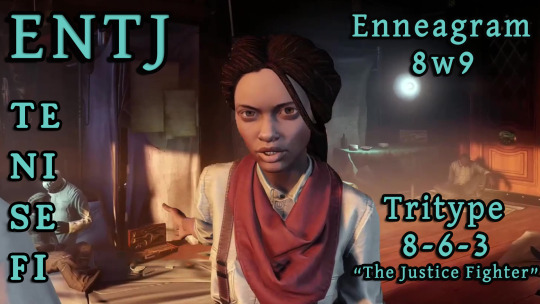
BioShock Infinite MBTI and Enneagram — Daisy Fitzroy
Daisy Fitzroy is a major side character who is both hero and a villain to our main protagonists.
Before we analyze her we will look into her past. Fitzroy’s birthplace and origins are unknown so we can’t speculate about her upbringing and past life, but we know that Jeremiah Fink "procured" her and brought her to Columbia intending to use her for menial labor within the city. As you would imagine she was not happy with this but she obliged for a short while. During that time Lady Annabelle Comstock employed her and had Daisy work as her maid. This worked well and Daisy ended up respecting Lady Comstock because she treated her with respect. Alas, that respect was short-lived. One day she found Lady Comstock dead and was wrongfully accused by her murderer Zachery Hale Comstock. Fitzroy escaped and vengefully founded the Vox populi. She was eventually captured by local authorities years later in Finkton. This lead to her being interrogated by Dr. Francis Pinchot who found out she had genius-level intelligence surpassing his. This resulted in the scientific community of Columbia declaring her a threat thus wanted to lobotomize her to make her more servile. Her intelligence impressed Dr. Pinchot, and he feared the lobotomy would render her useless, thus tried to stop it. We’ll be continuing this story in our analysis of her dominant function.
Dominant Function: Extroverted Thinking
Daisy Fitzroy is an exceptional TE user. She’s ambitious, intelligent, structured, and she knows how to turn situations to her advantage and quickly. To continue our story, we’ll be seeing the first example of her Te usage.
As Dr. Pinchot disagreed with the Columbia scientific community, Daisy formulated a plot to escape. She would use Pinchot and then eliminate him. This plan worked, she asked for “help” and lured him into bringing the keys to escape, she then shot him to tie up loose ends. Ruthless and efficient. Daisy then planned her revenge against The Founders. She quickly raised an army by using her voice of reason, telling them they are tools to be used and discarded like she was. Unlike Comstock, Daisy doesn’t mince words, she’s direct and to the point. You’re either helping us or you’re a liability.
Extroverted Thinking dominant and auxiliary users often see the world in black and white. Daisy Fitzroy is no exception she takes black and white thinking to the next level. Now we’ll be moving to Extroverted Thinking examples as seen within the game. Our first example will reflect her black and white thinking. Daisy states Fink sees people as livestock and wants to keep them controlled like the animals they are. She uses this as her argument to recruit more members to her cause by uniting them against a single cause. Daisy, however, is doing the same as Fink albeit, in a much more moralistic light, she uses people like tools to achieve her goals for the sake of revenge. Daisy exclusively uses facts and statements to prove her points. She often does that within her speeches and we can hear one of these speeches inside of the Graveyard Shift bar in Shantytown when Booker and Elizabeth enter the tear which allows the Vox populi to have their weapons for their revolution. Daisy mentions that if you were able to rationally think you’d be striving for your own dreams and aspirations. Not the aspirations of men who want to control you by telling you when to eat, when to sleep, when to stand or when to sit down. The thing is, Daisy Fitzroy is absolutely correct men like Fink and Comstock seek to control the people of Columbia, especially minorities such as Daisy Fitzroy. It’s entirely rational and in your own self-interest to defend yourself against people who will use you until you hit your breaking point. They only care for their self-benefit and will dispose of you when they’re done. Overall Daisy Fitzroy is a noble example of a TE user it was her structured mind that united the people of Shantytown against all of Columbia. She isn’t doing it because it’s the right thing to do. She’s doing it because it makes logical sense to not want to be oppressed, how could you succeed in life if every action you take is controlled by another individual.
As Malcolm X once said, “I believe that there will ultimately be a clash between the oppressed and those that do the oppressing. I believe that there will be a clash between those who want freedom, justice, and equality for everyone and those who want to continue the systems of exploitation.”
Auxiliary Function: Introverted Intuition
Daisy Fitzroy is a visionary and opportunist who knows how to use her NI function wisely. We’ll be backing up that claim with a brilliant example. During the start of the game, after Elizabeth knocks out Booker, he’s left unconscious on the First Lady airship. Daisy boards the airship with her Vox populi and runs into Booker. He demands her to get off his airship; she retorts by mentioning they’re in the middle of a war and that she needs his help. She does this by telling him if he wants his airship back he must work for her by getting her the weapons she needs for her revolution. She then knocks him out of the airship, sending him on his new quest. Her intuition about Booker ends up being correct. He succeeds and recovers the weapons she required to kick off her revolution. But now there’s an additional problem. Booker and Elizabeth needed to open up 2 tears into parallel universes to get this job done. Meaning this deal never happened when they meet up with Daisy Fitzroy again. Our next example of her NI function being used exceptionally is seen when Elizabeth and Booker return to Columbia through a tear, they arrive in a world where Booker died for the Vox populi. As they contact Daisy Fitzroy, she mentions there’s no way he survived since she saw him die with her own eyes she then turns her guards against these “imposters”. This ends up being a clever ruse. Fitzroy willingly sacrifices her men to lure Elizabeth and Booker closer to her. Once they reach her she pretends that she’s gone mad with power and she’s willing to kill children for her revolution. This causes Elizabeth to freak-out and murder Fitzroy while Booker distracts her. This plan was designed to harden Elizabeth by turning her into a killer. This action ultimately would be the one to ensure the success of Fitzroy’s revolution, the destruction of her oppressors, and all the events that occur in the original BioShock. Fitzroy may have not known it, but her sacrifice also saved the Little Sisters in Rapture and allowed Elizabeth to murder the final Comstock. We can see our last NI example in the DLC Burial at Sea in Fink’s private quarters. Within those quarters is a seized kinetoscope from the Graveyard Shift bar. Inside that kinetoscope lies Fitzroy's thoughts about God.
She believes there is no God and claims men like Comstock use the idea of God to control the common folk by shaming them.
" If there were no God, you could rest assured the first deed done by the first rich man would be inventin’ him.” - Daisy Fitzroy.
Within a historical context, Fitzroy is correct, the rich and powerful often used the “Wrath” of God to control the public. This was especially true in the Middle Ages to the 20th century.
Tertiary Function: Extroverted Sensing
Daisy Fitzroy doesn’t seem too interested in her Se function and prefers to use her dominant and auxiliary functions. However, that doesn’t mean she completely neglects it. We can see her Se function within her actions. These actions are usually caused by TE-SE loops. They often end up being violent because that is the quickest way to get results. To Daisy, actions are louder than words. Sure you can reason with people, but will it get you what you want right away? No, therefore take action. She keeps this mentality throughout the game. Most of these actions can be seen by how the Vox populi functions. She’s instructed them to act first by killing everyone and then decorate the area with red by claiming this is their territory now. Daisy is concerned about the future as seen by NI function but will achieve that by first destroying everything and striking fear into the hearts of the people who align themselves with the oppressors. Her tactics are basic overwhelm the enemy, do what you have to do, and execute the ones who won’t cooperate. Many of her speeches are driven by TE-SE loops, she’ll go on about facts, and then she’ll refer to the actions that The Founders have taken against the minorities to convince them fighting is the only choice. Our main example of SE can be seen in the Speech she makes about Booker DeWitt dying for the cause. She mentions he died for the cause and now we must stand true to the cause by killing Fink, to only relate it back to Booker’s death. With that logic she’s suggesting because Booker died for the cause we must also sacrifice our lives like he did because that is the truest way to show your dedication to the cause after all he’s a hero you want to be a hero right?
Inferior Function: Introverted Feeling
We can definitely see that Fitzroy struggles with her FI function. On one hand, she is very aware of how her feelings often control her when she enters angered states and that they drive her revolution but on another hand, she knows when they’re appropriate and when to seal them away.
We can hear her speaking about that within her voxophone recordings. Most of the recordings will follow the same premise she reflects on her morals and feelings towards her actions and then justifies it. So we’ll be using one voxophone example. This voxophone recording can found in the office of Jeremiah Fink chief executive area in the Burial at Sea DLC. This is before Daisy organized the Vox populi and rose up against her oppressors. Within the recording, she recognizes that violence only causes violence and that the rational mind wants to find a peaceful solution but she asks herself what does a father do when he sees his child bleed out on the streets? Do you deny him his vengeance? She then refers to her own moral code and understands because she’s been there and lived through it, this leads to the biggest question “Will I be able to stay the hand” From the actions we’ve seen in-game Daisy Fitzroy could not stay the hand and instead she gave in to her feelings and lead a revolution very much knowing she will hurt others to achieve her goals. She does, however, redeem herself within our last example. This occurs when the Luteces let her know she must make Elizabeth think she will harm Fink’s son so she could have her revolution succeed. That action was driven by her NI function to piece together the puzzle for the long term but was completely inspired by her FI function. Her moral code would not be broken even with all the anger in her heart Daisy never planned on harming children, especially Fink’s child because he did nothing wrong. “I will not hold the son to account for the deeds of his father”
https://youtu.be/2r6btwu_hPA
#BioShock#BioShock MBTI#BioShock Infinite#BioShock Infinite MBTI#enneagram#mbti personality types#MBTI#complex character#Daisy#Daisy Fitzroy#Fitzroy#BioShock Infinite MBTI and Enneagram#Bioshock Daisy Fitzroy MBTI#Daisy Fitzroy mbti#hero and villain#revolutionary#ENTJ#ENTJ 8w9#863#intelligent#Malcolm X inspired#rational#enneagram 8w9
20 notes
·
View notes